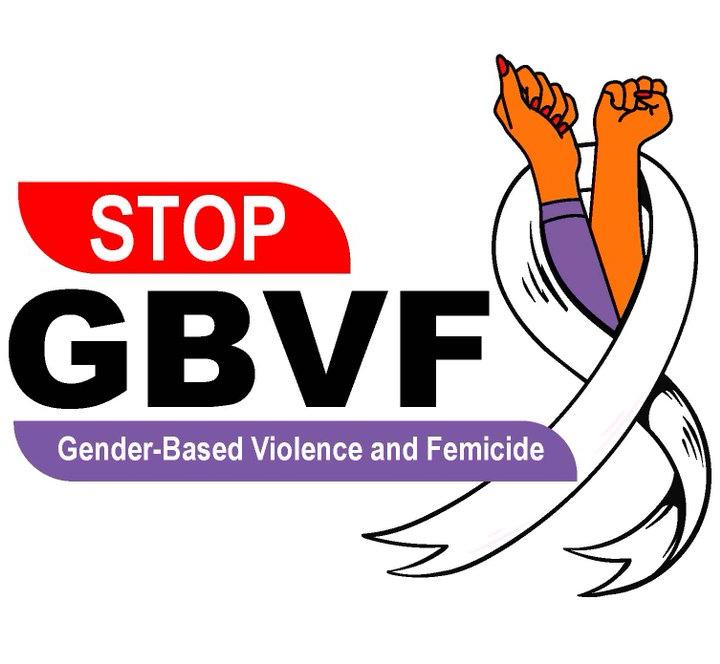Workers’ Month
celebrating the transformation of the labour market

Professor Glenda Gray’s outstanding commitment to serving the nation




Africa Month building the Africa we want

celebrating the transformation of the labour market

Professor Glenda Gray’s outstanding commitment to serving the nation




Africa Month building the Africa we want
10. Conversations with leaders
Professor Glenda Gray leaves behind a legacy of saving lives at the South African Medical Research Council
14. Women in the public sector Finance and Accounting Services SETA CEO Ayanda Mafuleka is embracing the opportunity to accelerate transformation
16. Trailblazer
South African Police Service Airwoman Tshomarelo Moima is fighting crime from the sky
18. Profiles in leadership
Bringing positive change to the country’s landscape is South African Council for Planners CEO Dr Tshepiso Lentsoane’s passion
20. Office of the President
Through democratic change, South Africans are reclaiming their dignity
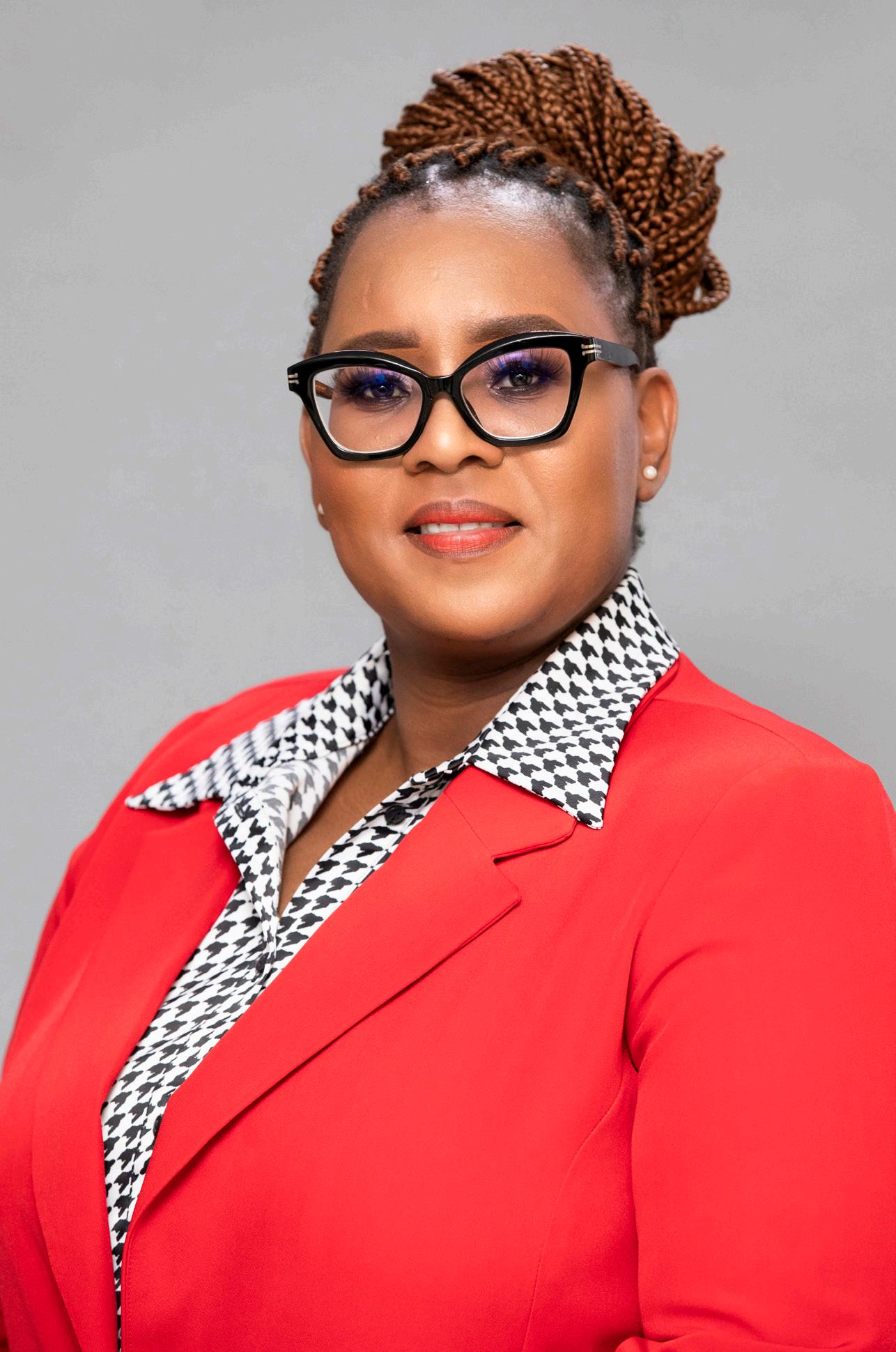
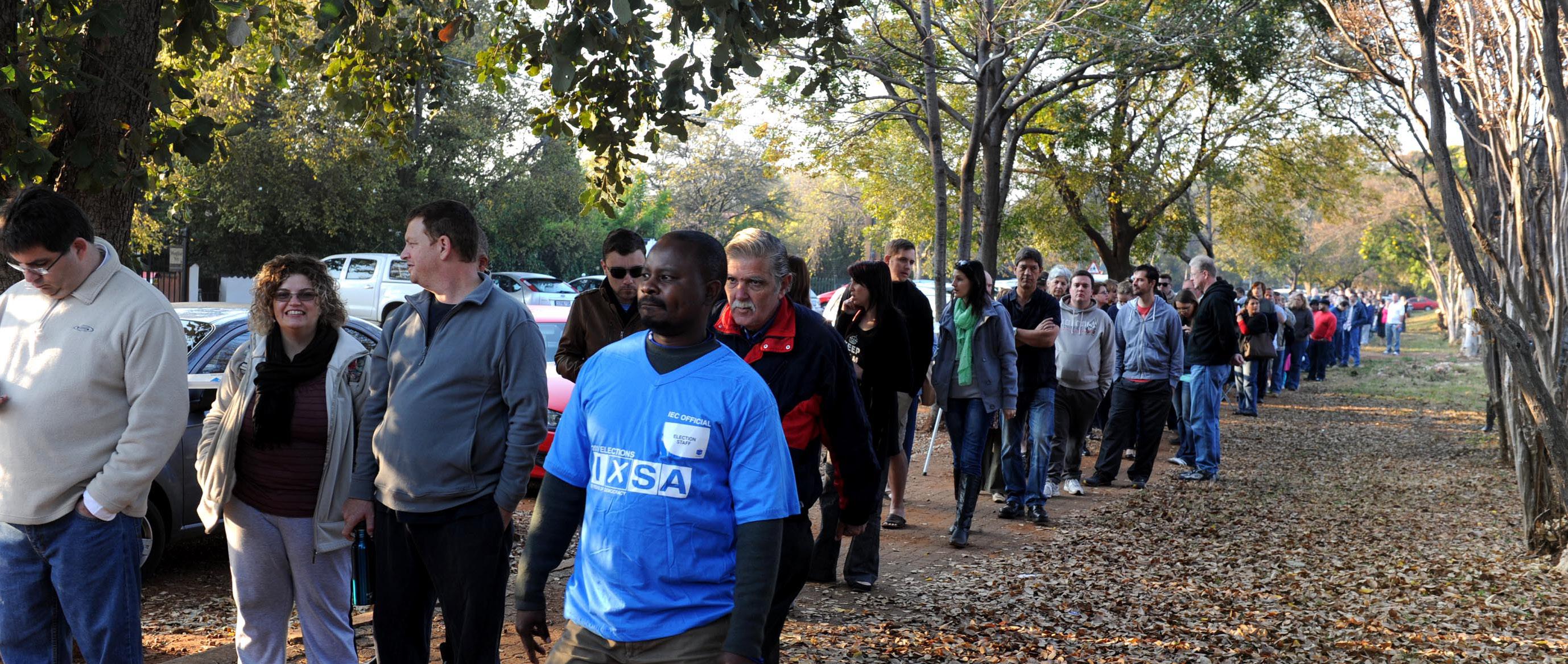
22. President Ramaphosa sets sights on five million EPWP jobs in next five years
Expanded Public Works Programme remains a critical instrument to tackle unemployment and reduce poverty
24. SAHPRA Signs MoU with Rwanda Food and Drug Authority
Cooperative partnership between SA and Rwanda will ensure access to safe and effective health products
26. Policy regime meets marketing prowess: a match proven incredible for Kenya arrivals to South Africa
South Africa reaps economic and cultural rewards from African tourists
28. All set for the 2024 General Elections
Vital information to know before casting your vote
30. A review of the 30 years freedom and democracy

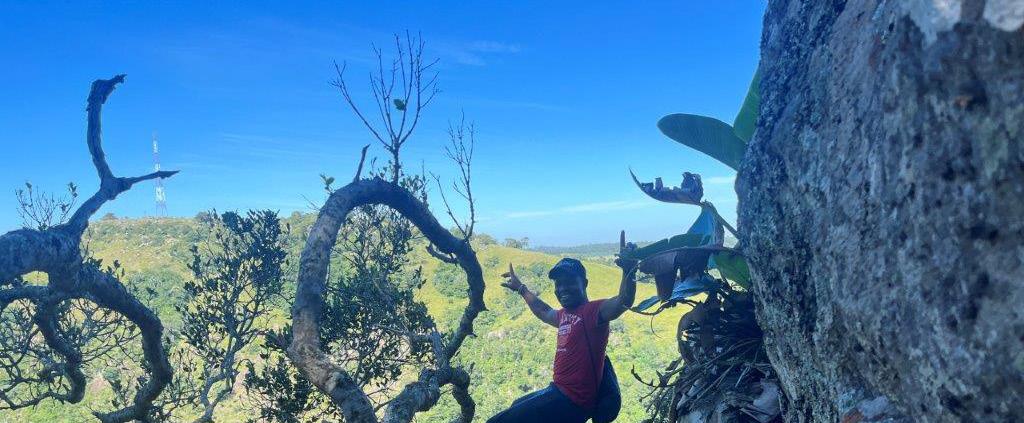
Remembering the sacrifices of our forebears for freedom and democracy

Public Sector Manager THE MAGAZINE FOR PUBLIC SECTOR DECISION-MAKERS
Publishers:
Government Communication and Information System (GCIS)
Enquiries: +27 012 473 0010
Switchboard: +27 012 473 0000
Tshedimosetso House: 1035 Francis Baard Street (corner Festival Street), Hatfield, Pretoria Private Bag X745, Pretoria, South Africa, 0001 www.gcis.gov.za
Acting Director-General Nomonde Mnukwa
Acting Deputy Director-General: Corporate Services Terry Vandayar
Deputy Director-General: Intergovernmental Coordination & Stakeholder Management Michael Currin
Deputy Director-General: Content Processing & Dissemination Regomoditswe Mavimbela
Head of Editorial and Production Zanele Mngadi Zanelemngadi@gcis.gov.za
Managing Editor Tshepo Nkosi tshepon@gcis.gov.za
News Editor Miriam Mokoena miriam@gcis.gov.za GCIS Photographic Unit Elmond Jiyane Ntswe Mokoena Siyabulela Duda Kopano Tlape Busisiwe Malungwane
Production Assistants Jauhara Khan | Nonjabulo Ntuli Lindelwa Fuku
Graphic Designer Tendai Gonese
As we celebrate Workers’ Month, let us reflect on changes in the labour market in the three decades of democracy, acknowledge the achievements of workers struggles, and the legislative reforms – a raft of labour legislation and protections, which give labour a
real voice, protect the rights of workers and take forward our goal of decent work for all.
The advent of democracy in 1994 ushered in a constitutional order premised on equality, freedom and human rights for all. It was a victory for non-racialism, non-sexism, human dignity and
democracy.
Addressing the nation on Freedom Day, President Cyril Ramaphosa highlighted some achievements made in empowering workers.
“Through affirmative action, broad-based black economic empowerment, worker share
ownership programmes and progressive labour laws, we have brought about transformative change in South Africa’s boardrooms, in workplaces and on the shop floor. In South Africa today, more than half a million workers are part-owners of the companies they work for. This is about one in every 20 workers in the formal private sector.
“The proportion of black people in senior management position in both government and business has increased many times over. We still have a long way to go before we can declare that all South Africans do indeed share in the wealth of the country. But we have made much progress, and we are determined to do much more,” he said.
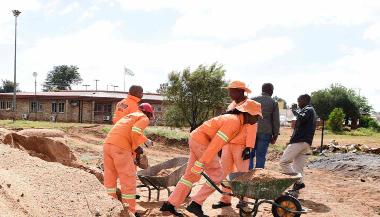
International Workers’ Day, celebrated annually on 1 May, has been commemorated for over
a century to recognise workers’ struggles for basic labour rights, and safe and decent conditions of work. The day stands not only as a tribute to the historic struggles of workers but also as a stark reminder of the ongoing fight for social and economic justice in workplaces.
As government, we honour the dignity of labour and reaffirm our steadfast commitment to advancing workers' rights, ensuring fair labour practices, and promoting a safe and inclusive work environment for all.
To commemorate 30 years of democracy and to recognise the role of organised labour in the struggle for democratic, human and labour rights, the Department of Employment and Labour will host the Elijah Barayi Memorial Lecture on 15 May.
The department has been a cornerstone in shaping the landscape of labour rights and protections. Through the formulation and enforcement of crucial legislation and regulations, such as the Labour Relations Act of 1995, Basic Conditions of Employment Act of 1997 and Occupational Health and Safety Act of 1993, government has erected a robust framework for fair labour practices, minimum employment standards, and workplace safety protocols.
Another landmark achievement that underscores government's commitment to social and economic equality is the introduction of the National Minimum Wage (NMW). This initiative ensures that even the most vulnerable workers receive a decent wage for their labour, thereby alleviating poverty and narrowing income disparities. As a result, over six million workers, including domestic and farm workers, immediately reaped the benefits, marking a significant stride towards greater equality. Collective bargaining has played a crucial role in improving workers' rights by negotiating better wages, benefits and working conditions. Through collective agreements, workers have been able to secure fair compensation, reasonable working hours and safer work environments. It has empowered trade unions by providing a platform for organised labour to negotiate with employers on behalf of workers.
Moreover, government recognises the pivotal role of employment equity legislation in fostering diversity and inclusion within the labour market. By promoting equal opportunities and representation for historically marginalised groups, we have reshaped the workforce
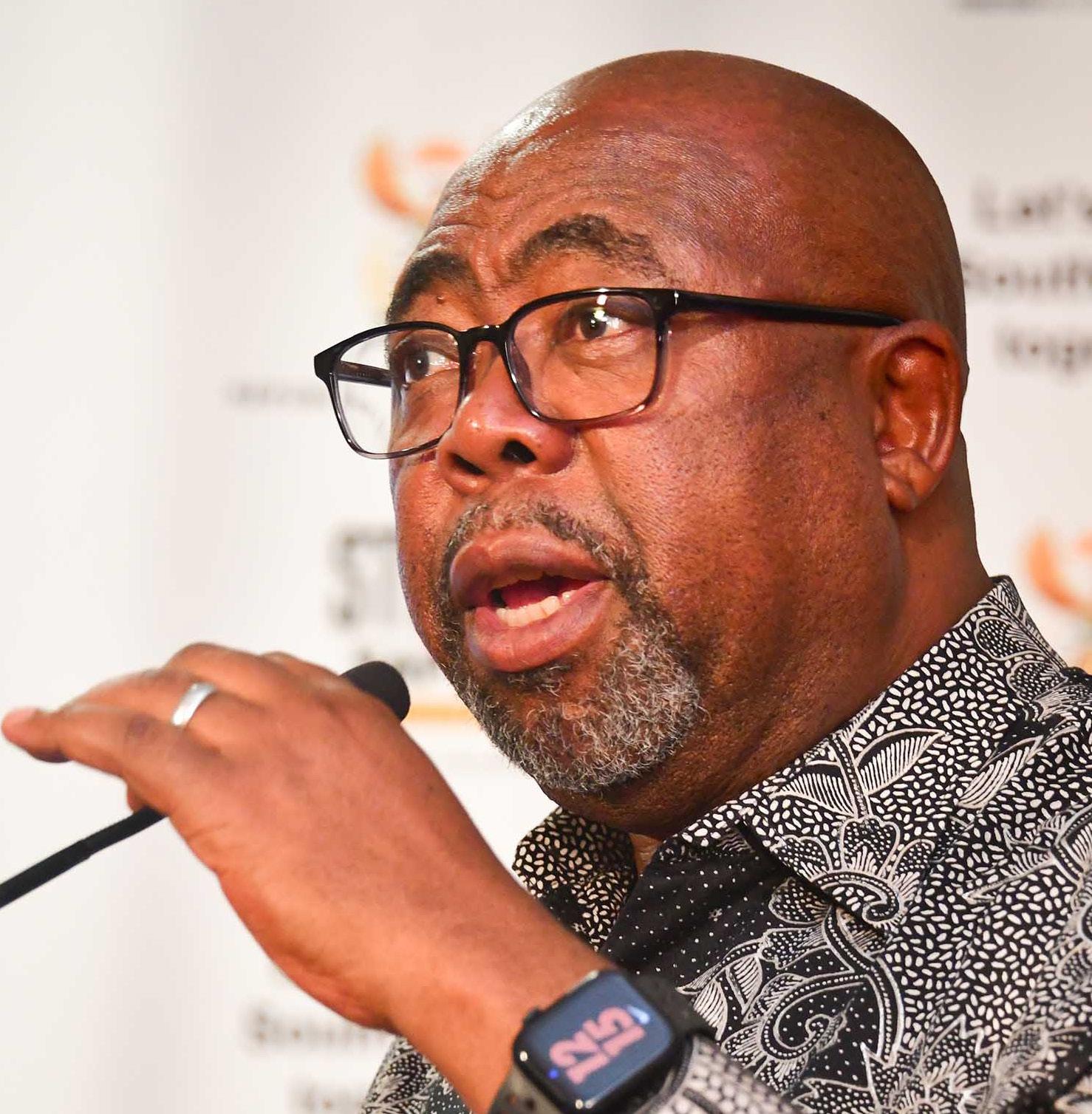
landscape, opening doors to previously overlooked talent and perspectives.
In tandem with these efforts, the expansion and enhancement of social security initiatives, such as unemployment insurance benefits and workers compensation, have provided a crucial safety net for workers and their families during times of hardship. These programmes not only mitigate poverty but also bolster social welfare, underlining government's commitment to leaving no one behind.
The Compensation Fund (CF) plays a crucial role in providing support and assistance to employees who have been injured or become ill due to work-related incidents. It has safeguarded the rights and well-being of employees by providing financial, medical, and rehabilitative
support in the event of workrelated injuries or illnesses. It ensures that employees receive the care and assistance they need to recover and reintegrate into the workforce, while promoting a safer and healthier working environment for all. Yet, challenges persist on the horizon, particularly in the face of unforeseen crises like the COVID-19 pandemic. In such turbulent times, initiatives like the Temporary Employer/Employee Relief Scheme (TERS) emerged as lifelines, providing vital support to businesses and workers grappling with economic disruptions. TERS injected billions into the economy, supporting businesses, safeguarding jobs, and stimulating economic activity, particularly among vulnerable small and medium-sized enterprises.
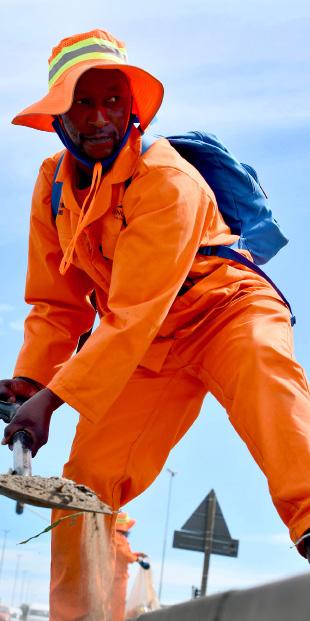
The South African economy continues to face challenges –slow growth, unemployment, load shedding, logistical bottlenecks at ports, escalating crime rates, geopolitical tensions and the global economic downturn.
The impact of these challenges reverberates throughout society, amplifying the urgency for decisive action to address their root causes. Recognising the gravity of the situation, government has embarked on a concerted effort to confront these obstacles.
One of the primary focuses is to tackle internal hurdles impeding economic growth and job creation. Efforts to mitigate the effects of load shedding and streamline port logistics
are underway, already showing progress.
Additionally, the Department of Employment and Labour has allocated resources to labour activation programmes aimed at stimulating job creation and fostering workforce participation. These initiatives underscore government's commitment to leveraging its resources effectively and catalysing positive change within the labour market. Furthermore, the rapid pace of technological advancement presents both opportunities and challenges for the workforce. Automation, artificial intelligence and robotics are reshaping industries and job markets, offering potential for increased efficiency and innovation. However, concerns persist regarding job displacement, skills mismatches and the imperative for continuous learning to remain employable in a digital age.
In collaboration with social partners, including the National Economic Development and Labour Council (Nedlac), government is actively addressing these new challenges. Efforts are underway to adapt to emerging forms of employment and support workers displaced by technological advancements, ensuring that the workforce remains resilient in the face of rapid change.
We acknowledge that unemployment still remains our biggest challenge. During this Workers' Month, the Department of Employment and Labour and its entities will showcase their work in a number of areas:
■ Job retention and creation: Public Employment Services, the Unemployment Insurance Fund (UIF) Labour Activation Programme, the Commission for Conciliation, Mediation and Arbitration (CCMA) and Productivity SA;
■ Social protection: the CF and the UIF; supporting sick, injured and unemployed workers and women on maternity leave;
■ Safe, healthy and decent working conditions: Occupational health and safety regulations and the work of the labour inspectors;
■ Conditions of employment: the enforcement of the Basic Conditions of Employment Act of 1997 and the National Minimum Wage;
■ Transforming the workplace: the introduction of guidelines to eliminate violence and harassment in
the workplace and the strengthening of employment equity regulations to encourage employers to make workplaces reflective of the population as a whole in terms of race, gender and disability.
■ Strengthening collective bargaining and workers’ rights: the operation of the Labour Relations Act of 1995 and the establishment of a robust system of industrial relations, as well as the work of the CCMA in supporting the system and facilitating the settlement of disputes.
■ Bargaining: the system also underpins a much broader system of social dialogue to address wider societal issues – led by Nedlac – and recognised for best practice globally. It was in Nedlac that we developed an ‘all of society’ response to the COVID-19 pandemic. Government remains committed to empower workers, protect labour rights and foster a culture of safety and fairness in workplaces across the nation. Let us work together to conserve and safeguard our achievements for future generations of workers.

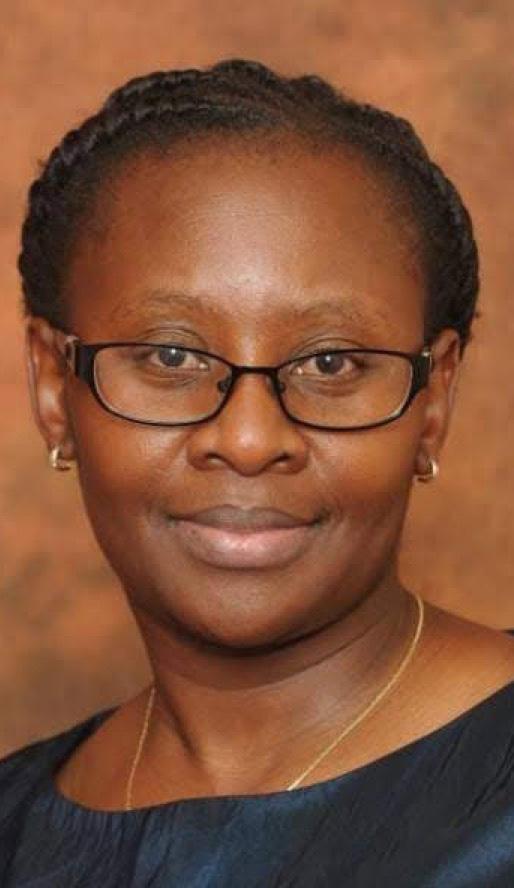
This May, the African continent unites in celebration of Africa Month, commemorating 61 years since the founding of the Organisation of African Unity, now known as the African Union (AU). Africa Month also seeks to increase the appreciation and demand for arts and culture goods and services, and to stimulate competitive markets for trade among African countries.
This year’s AU theme is, "Educate an African fit for the 21st century: Building resilient education systems for increased access to inclusive, lifelong, quality and relevant learning in Africa”.
At the core of the AU is Agenda 2063: The Africa we want – the
continent’s blueprint and master plan for transforming Africa into the global powerhouse of the future. It prioritises inclusive social and economic development, continental and regional integration, democratic governance, and peace and security amongst other issues aimed at repositioning Africa to becoming a dominant player in the global arena. Government supports regional and continental integration as cornerstones to the continent’s socio-economic development. As we commemorate Africa Month, it is important that we safeguard the continent’s prosperity and ensure peace. Government is com-
mitted to advancing the African Agenda and promoting regional development. We pursue multilateral interests at the continental level through our membership and participation in the AU. Our position is informed by our domestic policy, constitutional values as well as the African Agenda on peace and security, human rights, and economic and social development. Government continues to advance the implementation of the African Continental Free Trade Area (AfCFTA), and the AU’s Agenda 2063. In January 2024, President Cyril Ramaphosa launched the preferential trade by South Africa under the AfCFTA –
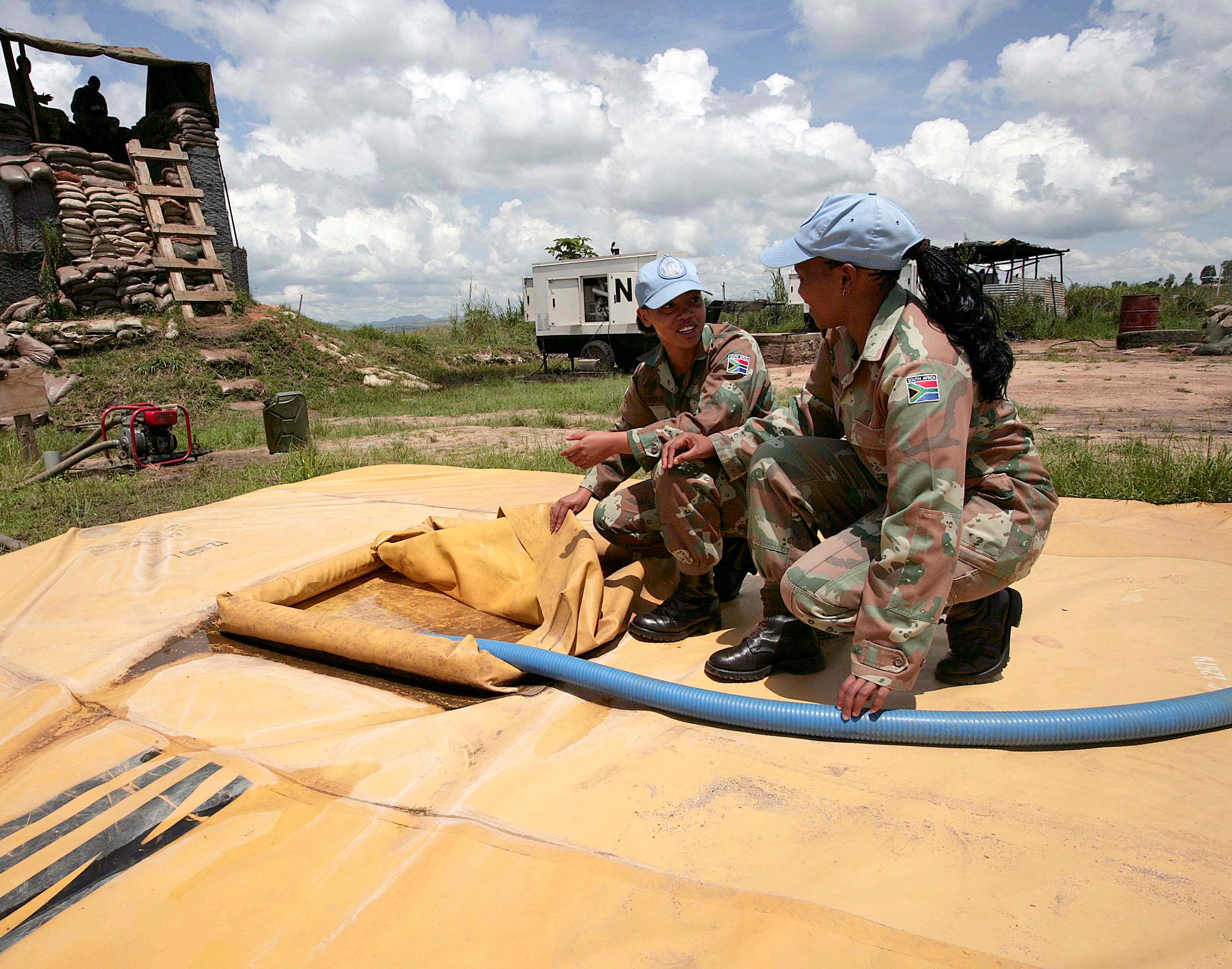
the largest free trade area in the world, and one of the flagship projects of Agenda 2063. This means that South African companies can export certain goods duty free or pay less duty to some African countries. This became a reality when the country became the first among the Southern African Customs Union member states, to practically realise the AfCFTA Agreement – by sending our first shipment of products to other countries trading under the agreement.
The AfCFTA, which brings together all 55-member states of the AU, aims to fast-track intra-African trade to more than R1.4 billion people, grow our economies, diversify our
exports, increase investment, create employment opportunities and improve the lives of people across the continent. As government, we are pleased that Southern African governments have already started to ramp up investments to expand land transport infrastructure.
South Africa also supports regional and continental initiatives to silence the guns on the continent, in support of Agenda 2063. This is aimed at ending wars and conflict, prevent genocide, and stop gender-based violence and femicide. We are committed towards the UN peacekeeping in Africa and around the world. As noted by the Resident Coordinator and
Head of the UN in South Africa, Nelson Muffuh, during the commemoration of the 2023 International Day of UN Peacekeepers, “many other South African men and women have paid the ultimate price in the service for global peace, including silencing the guns across Africa”.
According to the UN South Africa, as of May 2023, South Africa was providing 1 189 personnel to UN peacekeeping, making it the 15th-largest contributor among all UN member states. It was also the 6th-largest contributor of women peacekeepers, with 230 serving in various missions. The country’s largest deployment is in the Democratic Republic of
the Congo. It also contributes police personnel to the UN Interim Security Force for Abyei, Sudan and the UN Mission in South Sudan. We have also contributed to UN peace operations in Burundi, Ethiopia-Eritrea, Liberia, Nepal and to the United Nations–African Union Mission in Darfur, Sudan.
To further promote peacekeeping efforts on the continent, the Interpol National Central Bureau (NCB) is at the heart of the South African Police Service (SAPS), sitting structurally within the Crime Intelligence Division (CID). With over 66 000 Interpol points across South Africa, the NCB is SAPS’ lead agency for transnational police investigations linked to South Africa and its citizens.
As public servants, we are responsible for implementing the various government programmes aimed at building a stronger Africa. Our work does not go unnoticed as stated by the Resident Coordinator and Head of the UN in South Africa, “Our peacekeepers, South Africans among them, protect civilians, help build national capacities and institutions, advance political solutions and development, and build longterm peace”. ❖
Professor Glenda Gray’s passion to use scientific research to find solutions has contributed to saving lives in South Africa. Her illustrious commitment to use her skills to improve the lives of South Africans resembles key qualities of a true public servant.
As her tenure as President and Chief Executive Officer (CEO) of the South African Medical Research Council (SAMRC) comes to an end, Gray told Public Sector Manager magazine that she
will be going back to working full-time as a clinical researcher so that she can help find the HIV vaccine.
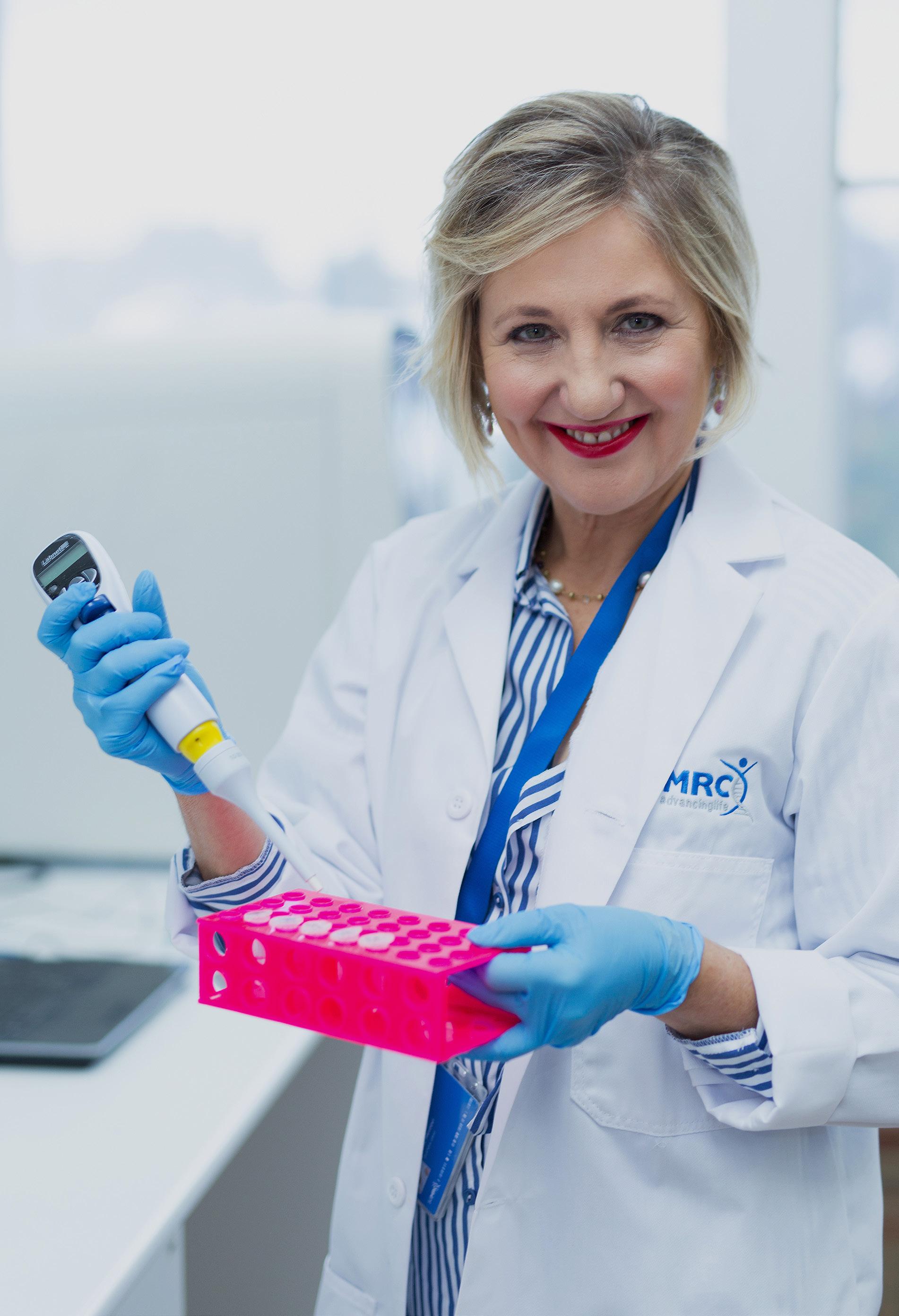
“We have funding to discover the vaccine and run clinical trials. I have got a very exciting programme to push the agenda
of HIV vaccine research forward in Africa, which is what I have done most of my life. So, I am going back to it,” Gray explained.
The fact that the work that she does in clinical research can directly be translated almost immediately into practice is what
keeps her passion alive, because she loves improving the wellbeing of the people.
In 2014, Gray was the first woman to be appointed as
the President and CEO of the SAMRC since its establishement in 1969. The SAMRC is dedicated to improve the health of South Africans through research, innovation, development and technology transfer.
Its scope of research includes laboratory investigations, clinical research and public health studies.
Gray joined the SAMRC when it was going through a strategic review because it was not doing well. Its reputation was in shambles. She was entrusted with leading the implementation of its new strategy and ensuring that the council regains credibility.
In her first five-year tenure at the helm of the SAMRC, the organisation experienced five consecutive clean audits, transformed grant-funding initiatives that significantly improved funding for young, black and women scientists; and established key collaborations and partnerships that will significantly progress scientific research.
“Repeatedly producing clean audits makes it easy for people to want to work with you because they trust you with their money. As a result, we attracted a lot of funding and trust in our organisation.
“Among others, we work with
entities like the National Institute of Health and The Bill & Melinda Gates Foundation in the United States of America, and the Medical Research Council in the United Kingdom, where we co-fund science programmes, including artificial intelligence, climate change, maternal and child health related research,” she explained.
Looking back over the ten years that she has led the SAMRC, Gray believes that she created and achieved a legacy of intentional transformation.
Since 1993, Gray has worked in various hospitals, including as a Neonatologist at Chris Hani Baragwanath Academic Hospital in Gauteng. During this time, she was confronted with the motherto-child transmission of HIV.
Part of her job required her to look for interventions that could combat the spread of the disease, and at that time there was not enough information about what could prevent mother-tochild transmission of HIV.
“We needed to find affordable interventions that could be used to prevent this in South Africa, especially in public hospitals,” she explained.
Because she saw how the disease was affecting innocent babies and killing scores of ordinary citizens, she committed to fighting tirelessly against HIV and AIDS through clinical research.
She and James McIntyre cofounded and led the globally eminent Perinatal HIV Research Unit at Chris Hani Baragwanath Hospital in 1996. For this work, they received the Nelson Mandela Health and Human Rights Award in 2002.
Gray is world-renowned for her research in HIV vaccines and interventions to prevent motherto-child transmission.
She is also co-Principal Investigator of the National Institutes of Health-funded HIV Vaccine Trials Network and directs the programme in Africa.
Amongst many others, Gray’s accolades include the Hero of Medicine Award from the International Association of Physicians in AIDS Care, and the Outstanding Africa Scientist Award from the European and Developing Countries Clinical Trials Partnership.
Forbes named Gray one of Africa’s 50 most Powerful Women and TIME as one of the world’s 100 Most Influential people. In 2013, she was awarded the
Order of Mapungubwe in Silver in recognition of her life-saving research in mother-to-child transmission of HIV and AIDS.
She is optimistic that South Africa will one day find a cure for HIV and is incredibly proud that the country has increased the life expectancy of people living with HIV and AIDS.
“When we started to work on the HIV and AIDS treatment in the 1990s, I was working with mothers and babies. There were no treatment trials for people in the public sector whereas several people who were admitted in private hospitals could get on trials for treatment,” she explained.
This means a lot of people who were considered poor could not participate in the trials for treatment.
Eventually, Gray and other clinical researchers managed to convince pharmaceutical companies to enable trials to be conducted in public healthcare facilities.
“These trials saved women’s lives and we were able to do them in Soweto. Soon after, because we did such a good job, we started to conduct more studies at the Chris Hani Baragwanath Academic Hospital, particularly in paediatrics,

and this led to the registration of antiretrovirals (ARVs) for babies’ use,” she added.
This also resulted in formulations for children being registered globally.
“That period was very important because it established our ability to roll out ARVs, and they eventually became cheaper. The sentiments [about the disease] also changed in the country, and we were able to get more people on the treatment programme,” she said.
She added that between 2004 and 2006, a lot of people were dying from HIV and AIDSrelated diseases in the coun-
try. But suddenly, when more people were being introduced to the treatment, the death rates started declining.
Now, she is also proud that HIV patients no longer need to take a cocktail of pills daily but only one pill per day.
While executing her duties as a leader at the SAMRC, Gray also chaired the Research Committee on COVID-19, bringing together scientific evidence and experience to the Minister of Health and the National Coronavirus Command Council.
“I am just glad that during this period, I made South Africans proud of the work that we do.
“You must be bold and intentional in what you want to achieve”.
I guess my legacy is that you must be bold and intentional in what you want to achieve,” she said.
Modestly, she defines a true public servant as someone who brings excellence to the Public Service with the aim of improving people's lives.
A National Research Foundation A1-rated scientist, Gray boasts of 37 years of experience in the medical science profession. She spent most of her ca-
reer in the Public Service, having started as a Medical Doctor in 1987 and qualified as a paediatrician 1993.
She studied Medicine and Paediatrics at Wits University where she remains a full professor for research in the School of Clinical Medicine. She also holds Doctor of Science degrees from Simon Fraser and Stellenbosch Universities , and a Doctor of Law Degree from Rhodes University. ❖
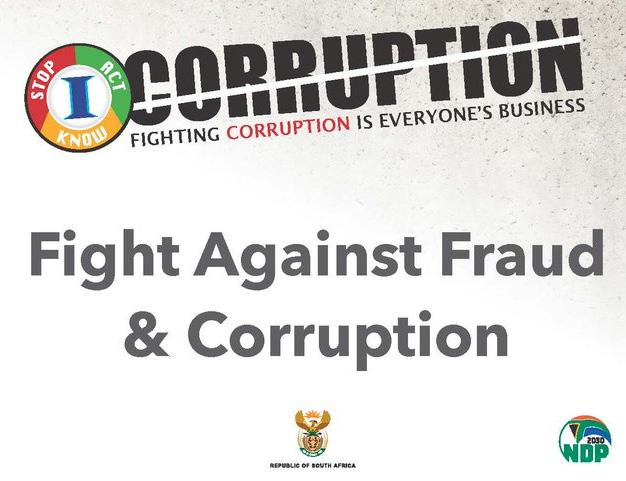

The country’s alarming unemployment rate presents the Finance and Accounting Services Sector Education and Training Authority (Fasset) with an opportunity to accelerate transformation and change lives, says the authority’s Chief Executive Officer (CEO), Ayanda Mafuleka.
The authority is responsible for the finance and accounting services sector in the country. The sector includes investment entities, trusts and company secretary services, stockbroking and financial markets,
financial development organisations, accounting, bookkeeping, and auditing and tax services. It also includes business and management consulting services; the South African Revenue Service; national and provincial treasuries; and other
activities auxiliary to financial intermediation, such as debt collection.
Established in 2000, Fasset is one of the country’s 27 sector education and training authorities (SETAs).
Speaking to Public Sector
Manager magazine in a recent interview, the seasoned public servant said the SETA holds itself accountable for skills development, transformation and social upliftment in one of the most vital sectors of the country’s economy.
“This means we need to think ahead and identify young talent at its roots,” she explained.
Fasset, she said, adopts a pipeline approach to funding, supporting its beneficiaries when they enter high school, through career awareness and a programme in Maths, English and Accounting.
“At undergraduate level, we offer bursaries and academic support, lessening the financial burden on promising candidates. Our internship programme prepares them for the workplace, through experiential learning at sector employers. And we do not stop there,” she illustrated.
Fasset’s Lifelong Learning, Professional Body Programme, Executive Development Programme, and Learnerships and Entrepreneurship Programme are designed to bring out the best in young graduates, at every stage of their journey.
The authority also provides support to learning institutions, equipping some technical and vocational education and training and community education and training colleges with topof-the-range information and communications technology hubs and mobile classrooms.
While 2 455 learners benefitted from Fasset’s Learner Internship Programme, 27 143 benefitted from its Lifelong Learning programme in 2022/23.
“In a fast-changing digital economy, we are helping to build the entrepreneurs of tomorrow,” she said.
For the Seta to have greater impact, Mafuleka said the authority needed to do more to improve the lives and better the prospects of persons with disabilities, saying this group was often overlooked for employment, and are subject to misperception and prejudice despite the equal rights they are afforded by the Constitution.
“We are currently configuring a programme for persons with disabilities, and with my time at Fasset coming to a close, I would love to see the
programme take off and make a positive and meaningful difference,” said Mafuleka, who began her stint in 2019.
As the country celebrates its 30 years of democracy, the CEO reflected on the journey to transforming the sector. Asked if enough had been done in this regard, her response was a frank “no”.
“If enough had been done to transform the sector, there would be no need for us to do more. Rather, even as we look back and acknowledge the milestones that mark our incredible journey from oppression to emancipation, we must dedicate ourselves anew to the task of building the better society of our hopes and dreams,” she added.
She added that the work the Fasset does today will make all the difference.
“Our young democracy has come a long way. It is up to all of us to make it go further, and to realise the noble ideals of the struggle on which it was founded,” she said.
In November 2023, Mafuleka was nominated in the Standard Bank Top Women Awards in the public sector category.
She said the nomination was not only a personal affirmation,
but also a tribute to the people she worked with.
“It means we are being recognised for doing things right, and for doing the right thing. But even as we take a moment to bask in the glow, we must remind ourselves that nobody in the Public Service works to earn an award. We work to serve the public. We work to meet our mandate of making the future count,” she added. She described the authority as a multifaceted organisation. “It is like a diamond, not only because it reflects our brightest hopes for nurturing and developing skills in the finance and accounting services sector, but because it symbolises the way brilliance emerges under pressure.
“With this in mind, I would like to believe that the nomination pays tribute to the great successes we have had in responding to national priorities, and in particular, in addressing the gender imbalance in our sector. I have made it my mission to bring about real, meaningful transformation, beyond the ticking of boxes and the reporting of numbers” said the CEO. ❖
Alife-long dream to become an air force fighter pilot has somewhat been realised for determined South African Police Service (SAPS) airwoman, Warrant Officer Tshomarelo Moima.
A little over a decade ago, while reading a newspaper, she came across an SAPS advert calling on aspirant pilots to apply for its air wing training programme.
At the time, she was pursuing a degree in mechanical engineering at the University of Pretoria after completing her matric at Cornerstone College in Silverton, Tshwane.
She would not receive any feedback on the application until 2016 when she and eight other young women were recruited into the programme. The cost of their training was met by the Transport Education Training Authority (TETA).
Committed to the programme, she was forced to continue with
her tertiary education on a parttime basis at the University of South Africa.
“I do not know why the recruitment took that long. I had even forgotten about it. But when SAPS contacted me, I knew exactly why they were calling,” she recalled.
For the Mamelodi-born 31-yearold, this was the beginning of the realisation of a life-long ambition. She had been introduced to the career path when she was in Grade 10.
“I had always wanted to be a fighter pilot for the Air Force. While I was in high school we were introduced to a model flying club, and from Grade 10 to 12 – every Tuesday and Thursday – we would go to a flying field somewhere in Pretoria east and we would fly model aircrafts,” explained Moima.
Beyond this, she and her schoolmates would visit mili-
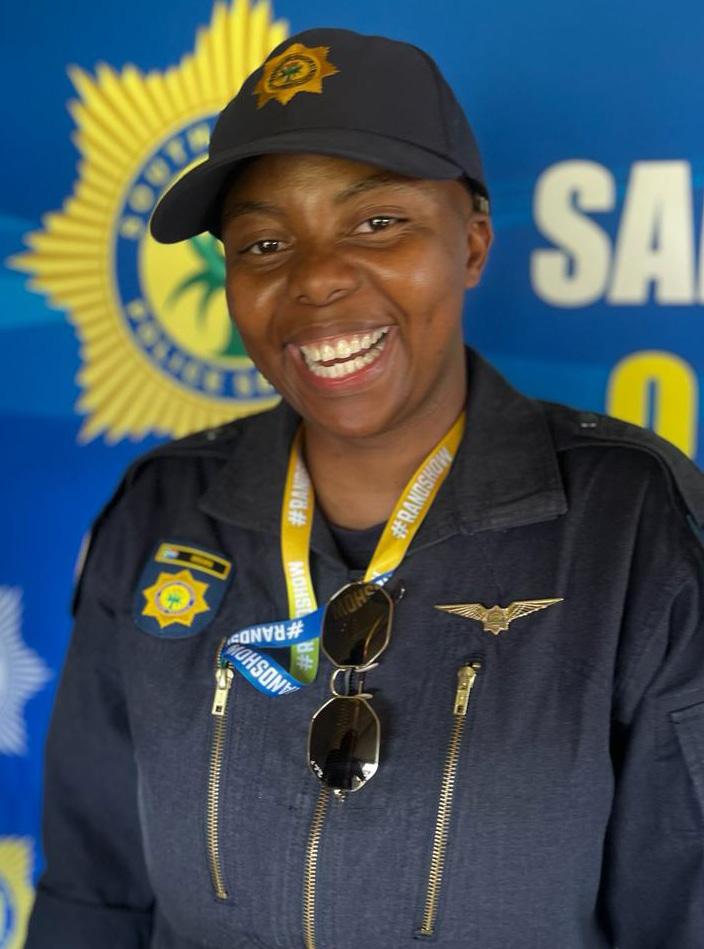
tary air shows in Swartkop and Waterkloof, among others. The leader of the programme also took the learners to the Council for Scientific and Industrial Research, where they got to experiment and explore aeronautical engineering.
“So I have always been in this space,” she said.
Today, she holds a commercial pilot license and has been flying South African skies for nine years. She is also a pilot license instructor based at the SAPS Wonderboom Airwing, where she is one of 11 female pilots.
At her base, she executes various roles and responsibilities.
The airwing unit consists of aircrafts and helicopters that are responsible for policing operations, ranging from routine patrols to search and rescue operations, to support operations for high risk units, which include the Special Task Force, the Counter Assault Team, the National Intervention Unit, Tactical Response Teams and the Public Order Police Unit. They also provide operational support during public unrests and crowd control operations, vehicle, Stock as well as game theft operations.
They mainly focus on tracking and tracing suspects in high risk incidents such as cash-intransit heists, armed robberies,

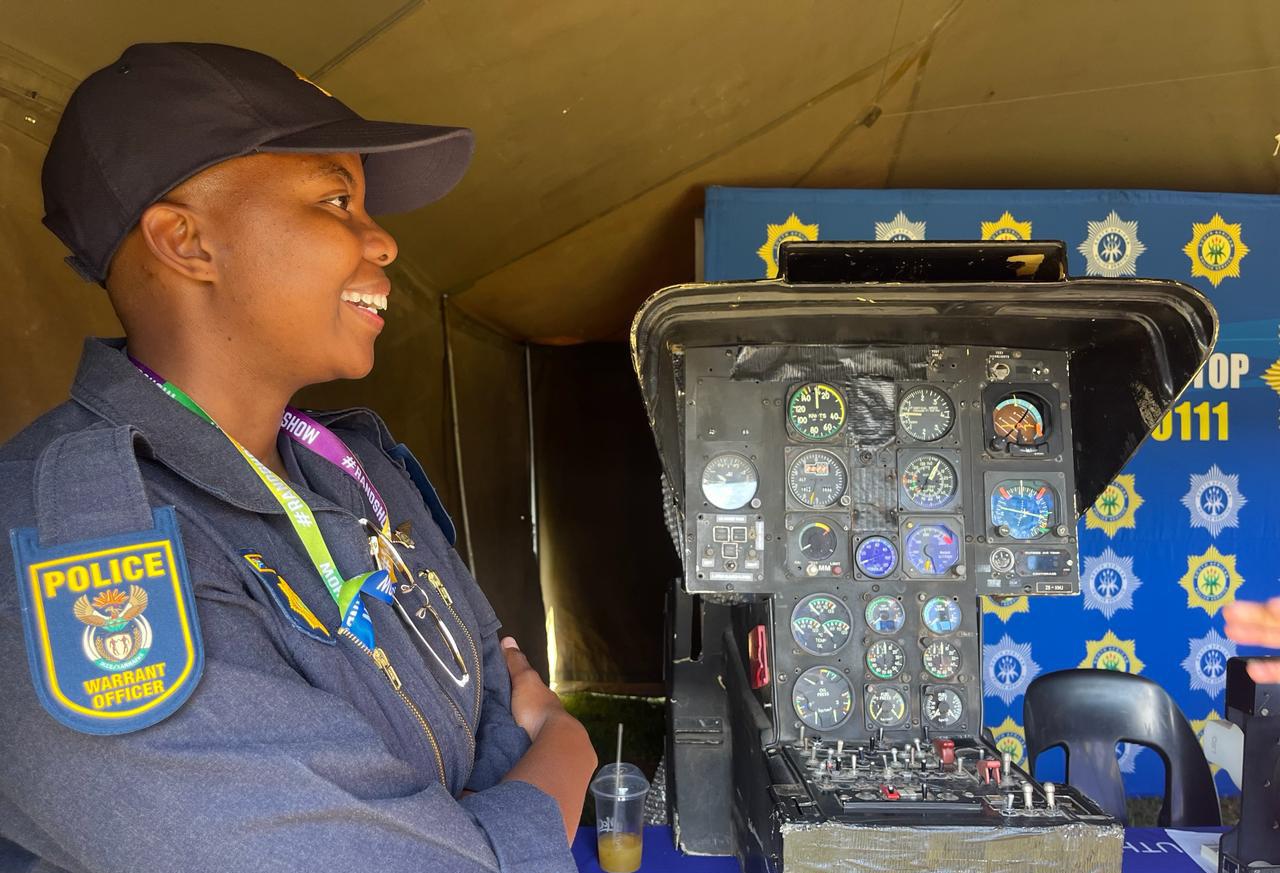
hijackings and a host of other serious and violent crimes.
“We do VIP transport (for the Minister, Deputy Minister and senior officials within the SAPS); we do search and rescue operations with our helicopters; and we do car hijack chase operations when we are on standby,” she explained.
Reflecting on her work, she said she takes satisfaction in knowing that her job positively impacted the lives of ordinary citizens, ensuring the visibility
of police not only on the ground but also in the air, “making sure that the average South African feels safe”.
“Our work is very technical and some women struggle a bit with the technical aspect of it but otherwise I find that women fare much better than our male counterparts, mainly because women are just hard workers.
“When it comes to the overall aspect of this – studying, passing exams, and even flying the airplanes – I feel like women do
much better because we are perfectionists.”
Going forward, she would like to see herself become a designated flight examiner – the highest level flight instructor.
“I love teaching, together with flying, those are my biggest passions, so combining them would be great. I would like to go as far as I can with teaching flying,” she said.
Moima can fly a King Air 200 and a Diamond Twin Star. She has performed stunts at the Swartkop Air Show in Centurion and Lowveld Airshow in Nelspruit.
Moima has engaged with the young people looking to pursue a career where the sky is literally the limit. She encouraged young people between the ages of 18 and 35 who are interested in becoming pilots to apply for bursaries from TETA and SACAA to follow in her footsteps. ❖
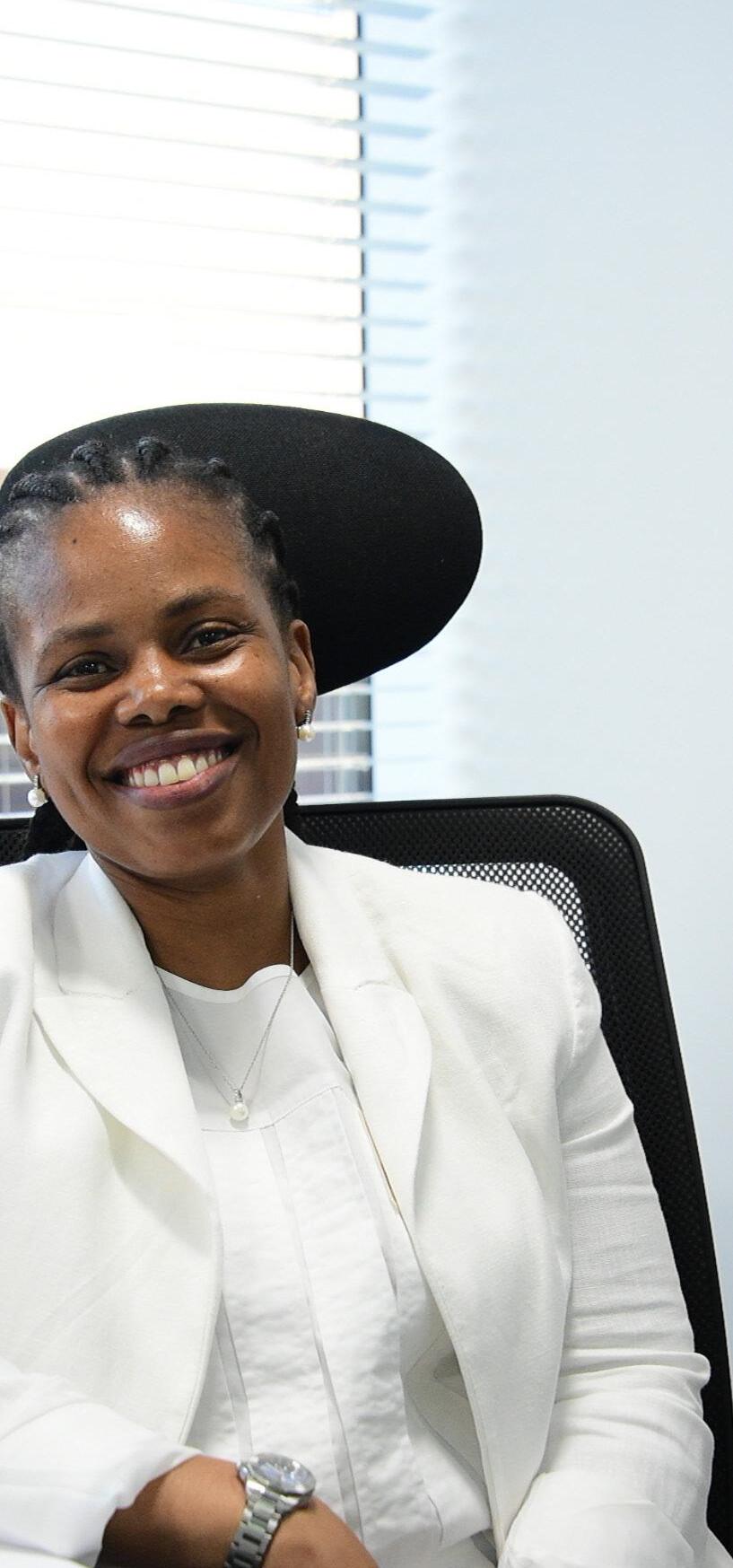
Without town and regional planners, it would be impossible for South Africa to build viable and integrated communities.
For every community to be fully functional and viable, proper planning is essential to ensure the availability of houses, schools, healthcare facilities, shopping complexes and proper road infrastructure.
This is where professionals like Dr Tshepiso Lentsoane – a town planner by profession – come in.
Lentsoane is the chief executive officer (CEO) of the South African Council for Planners (SACPLAN), a statutory council established with the sole purpose of regulating the Planning Profession Act of 2002.
Town and regional planning is a profession that promotes and manages change through the planning, design, implementation and management of public interventions in the development and use of land.
“We are responsible for registering town and regional planners so that they are accountable, mostly to
the public. We are responsible for creating an orderly built environment,” she explained.
The council also accredits tertiary institutions that offer qualifications in the profession so that they can meet local and international standards. It also provides financial support to students who are pursuing careers in town and regional planning, among other things.
Having joined the SACPLAN in January 2024, as the CEO, Lentsoane boasts more than two decades of experience in the profession, including working for government and the private sector.
“I have worked as a town planner for the City of Johannesburg and the Department of Rural Development and Land Reform. From 2014 to 2019, I worked as a divisional head for operations and projects at the City of Ekurhuleni,” she explained.
In 2020, she opened her private practice as a specialist in the built environment, offering services that include spatial planning, land use

and economic planning and transport planning, among others. All while also working as an advisor to the MEC for Economic Development in Gauteng.
She was inspired to pursue a career in the profession because of her love for people and space.
“I love geography and anything to do with space-making. I have always wanted to understand the relationship between race and spatial planning because I grew up being aware that most black people stay far away from urban areas,” she said.
She chose to pursue a career in town and regional planning because she wanted to influence transformation and create a balance by ensuring that she closes the gaps created by space and race.
She believes that the ultimate role of town and regional planners is to ensure that there is justice in the built environment, and that there is balance and harmony in the sector because
people’s socio-economic conditions are affected by it.
Lentsoane defines smart cities as those that do not take a lot from the environment, but rather relies on it to improve the quality of life because they are designed in a way that they also give back to the environment instead of harming it.
“A smart city is the one that respects and protects the environment, it is green and allows for alternative use of material such as recycling energy, water and other natural resources, as well as technology that does not harm the environment,” she explained.
Lentsoane noted that while there are already pockets of excellence because of smart buildings completed in various parts of the country, the process needs to be expedited.
“We need to ensure that this does not happen in the cities
only, but [ensure that] all the new malls that are going to be built in the townships are also in line with the vision of building smart cities. This is a conversation that we are having with government leaders and the business sector,” she explained.
As the newly appointed CEO, her vision comprises building credibility in the organisation and the profession, increasing the sense of urgency among professionals in the sector and ensuring that they are accountable to the public.
She is also planning to ensure that the SACPLAN becomes more accessible to the the public because it is currently more accessible to town and regional planners.
Lentsoane believes that South Africans have a lot to celebrate, and the fact that she is currently a CEO of a state entity speaks volumes because it can only
be because of the freedom and democracy that the country attained 30 years ago.
“Today we can speak up on what is wrong or right, and we occupy positions that we would not have if we were still under the apartheid regime. We need to jealously guard our freedom and democracy, and that is why it is important to vote, because whether you vote or not you are deciding. We need to reflect on what liberation means to us and what we want to improve moving forward,” she said.
Lentsoane holds a Bachelor of Technology Degree in Town and Regional Planning from the University of Johannesburg, a Master’s Degree in Urban and Regional Planning from the University of Pretoria, a Master’s Degree in Entrepreneur Management and Innovation from the University of Bath in England, and a PhD in Urban and Regional Planning from the North-West University. ❖
On Saturday, 27 April 2024, South Africa celebrated the 30th anniversary of the country’s first democratic elections. It was the day that changed our country forever.
It was the day on which the country turned its back on apartheid. Beyond the great wrong that was apartheid, it was a system designed to deny people their dignity.
This national humiliation and degradation ranged from bureaucratic pettiness like whites-only benches, restaurants and beaches, to the brute force that saw families torn apart and forcibly moved from their houses and land. People were tortured, imprisoned, exiled and killed. The so-called solution of ‘separate development’ resulted in nothing but underdevelopment for the country’s majority.
As President Nelson Mandela once said, in the system of apartheid, both the oppressed and the oppressor alike are robbed of their humanity.
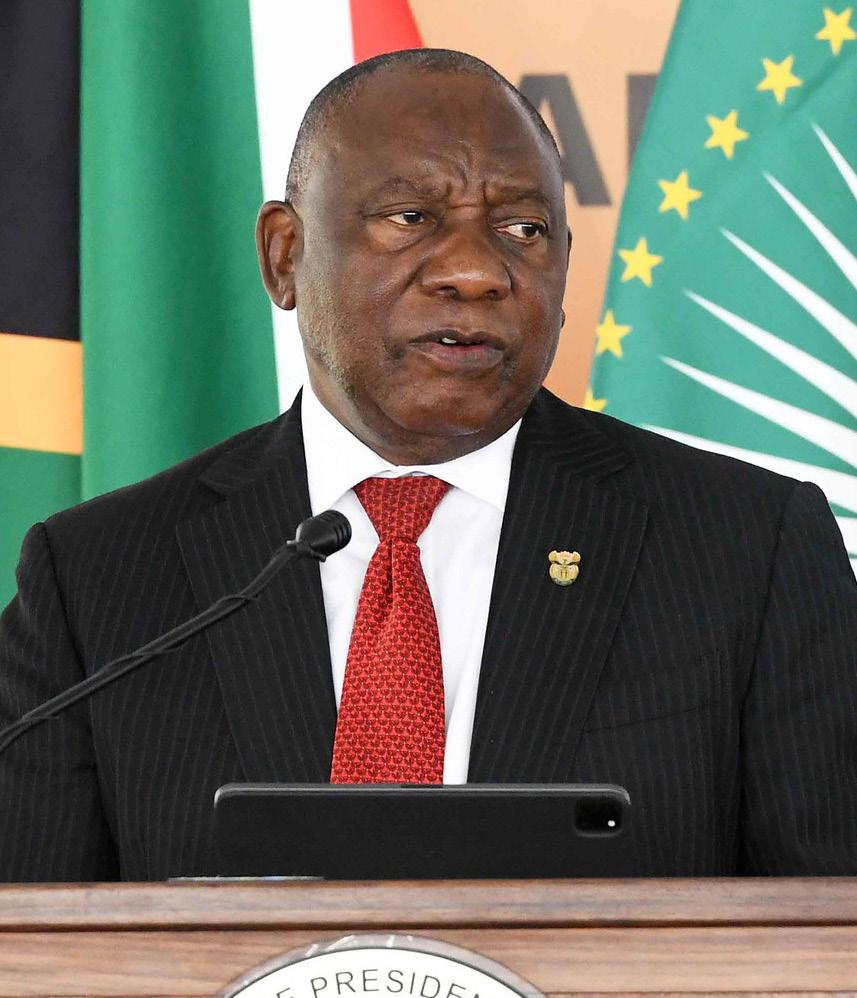
That is why the task of national reconciliation we embarked on in 1994 was as much about liberating white South Africans from the shackles of prejudice and fear as it was about freeing black South Africans from the indignity
of apartheid.
As we continuously strive towards nationhood, it is critical that all South Africans, be they white, black, Indian and coloured, remain part of this journey. This becomes all the more
important at times of difficulty, when there is a temptation to retreat into laagers of ethnicity and race. For the sake of national unity, we should resist this temptation. We should acknowledge feelings of marginalisation and address them.
The democratic breakthrough of 1994 began the restoration of the dignity of black South Africans that had been denied and systematically eroded, first by colonialism then by apartheid.
Despite the many challenges our country continues to experience, not least of all the crisis of unemployment, South Africans are pioneering, resourceful and resilient, often in the face of great odds.
What always strikes me during my interaction with young South African men and women born into democracy is the confidence they exude, secure in the knowledge that their dignity is both respected and protected. Democracy’s children are self-assured about their human
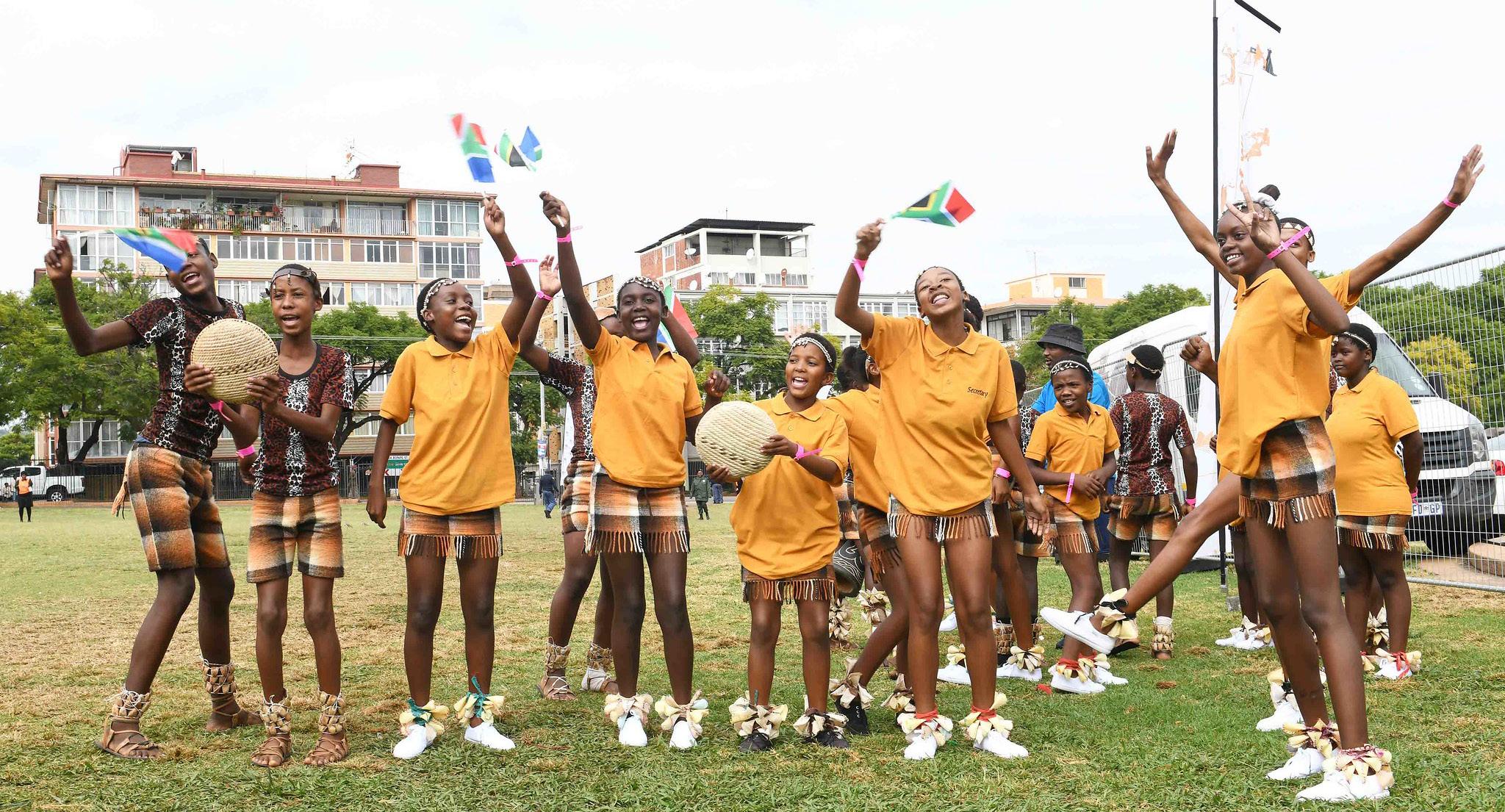
rights, in their citizenship, of their role and place in society, and of their own potential.
During apartheid, Bantu education was served up to the country’s black majority as a reminder that there was no place for them ‘above the level of certain forms of labour’. In South Africa today, equal access to quality education has enabled black children to become Chief Executive Officers of companies, professors, engineers and fighter pilots.
Young South Africans, our nation’s future, are making their mark in the workplace, in arts, culture and music, in academia, in the high-growth tech and information technology sectors, and in serving their communities.
They are also politically astute and civically engaged. Some 77% of new voters registered in preparation for the forthcoming election are young people under
the age of 29.
At times of difficulty in the life of our nation, some have found themselves tempted to question whether life has really been better under democracy. For all who experienced apartheid, there can be no doubt that democracy has restored the dignity of every South African.
Each time I meet with the many young people born into a free South Africa, when I look at the vast, profound, transformative change this country has undergone over the past thirty years, I feel a profound sense of gratitude.
I am grateful that they will never have to endure the humility and indignity of previous generations, of being forced to sit on separate park benches, dispossessed of their land, denied opportunities for advancement and of being pariahs in the land of their birth.
During Freedom Month, when we collectively reflected on how far we have come in building a new nation, we knew that we were not as far as we had hoped to be. While we have done much to undo the devastating legacy of apartheid, we have confronted other challenges, both from beyond our borders, such as the global financial crisis, and here at home.
In recent years, as we sought to recover from more than a decade of low growth and the era of state capture, our progress was interrupted by the COVID-19 pandemic, which led to the loss of more than 100 000 lives in our country and caused the greatest contraction of our economy in decades. The public unrest in July 2021 and the catastrophic floods in parts of the country the following year led to further loss of life and destruction of property and infrastructure.
While these events severely hampered our collective efforts to rebuild the country, they also showed the resilience of the South African people. Despite these great difficulties, we have persevered with the task of reform and recovery, to grow an inclusive economy and create jobs.
We have continued to work together to overcome the crises of unemployment, poverty, inequality and underdevelopment. These challenges impact on the lives of millions of people and undermine the dignity that we have worked throughout our democracy to restore.
And yet we maintain our resolve to move forward with optimism. We have come a long, long way. And we are determined to go further to achieve the free, just and equal South Africa for which millions voted on Freedom Day 30 years ago. ❖
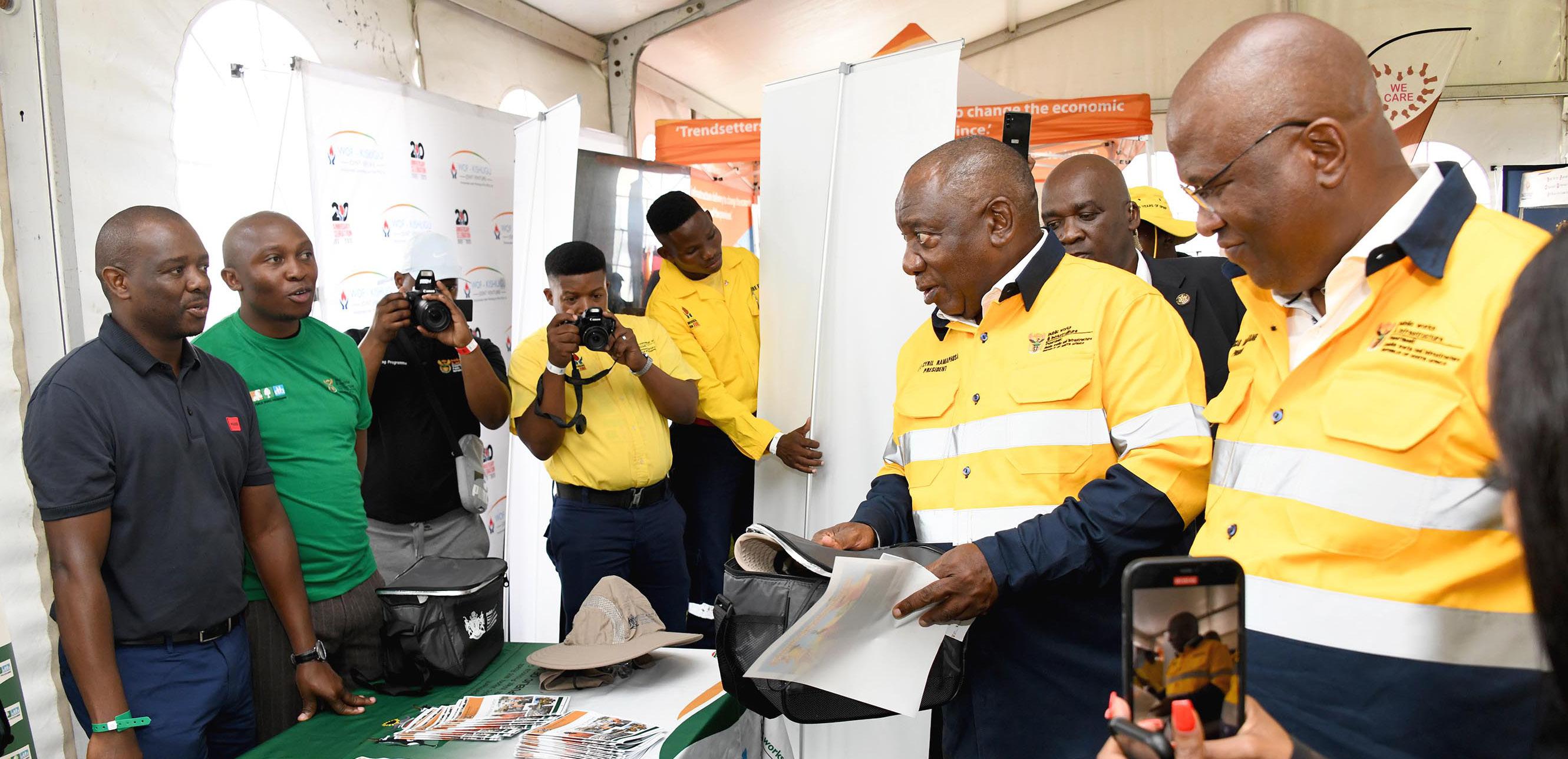
President Cyril Ramaphosa believes that the Expanded Public Works Programme (EPWP) remains a critical policy instrument to tackle unemploy-
ment and reduce poverty as government grapples with high levels of joblessness.
The President has since pledged on behalf of govern-
ment to improve the EPWP and to deliver five million work opportunities in the next five years. He was speaking at the 20Year celebration of the EPWP
and launch of Phase 5 of the programme held recently in Buffalo City Municipality, Eastern Cape.
The President painted the EPWP as a success story that has empowered communities to address local needs and build resilience.
The country’s commanderin-chief said since 2004, the programme has created more than 14 million work opportunities across the EPWP sectors, with more than 300 public bodies across all spheres of government and non-profit organisations as implementing agents.
“The EPWP is changing lives and transforming communities, and the evidence is there for all to see,” President Ramaphosa told the crowd.
Through the EPWP infrastructure projects, President Ramaphosa said Welisizwe Rural Bridges are constructed and maintained to create better access to markets, schools and clinics.
Beneficiaries include those cleaning streets and beaches, and those involved in Early Childhood Development, community home-based care, school feeding and community crime prevention.
According to the President, some of the beneficiaries have gone on to be trained as emergency response personnel in the South African Police and even qualified as pilots.
While there are many achievements, President
Ramaphosa urged government to use the 20-year milestone as a springboard for even greater achievements in the years to come.
“We must build not only on lessons from the EPWP but also from the Presidential Employment Stimulus, which has, over the last few years, demonstrated that public employment can go to significantly greater levels of scale.”
However, he acknowledged that the quality of work experience and service delivered to the communities needed to be improved.
According to the President, government also needs to mobilise the nation behind a revitalised portfolio of public
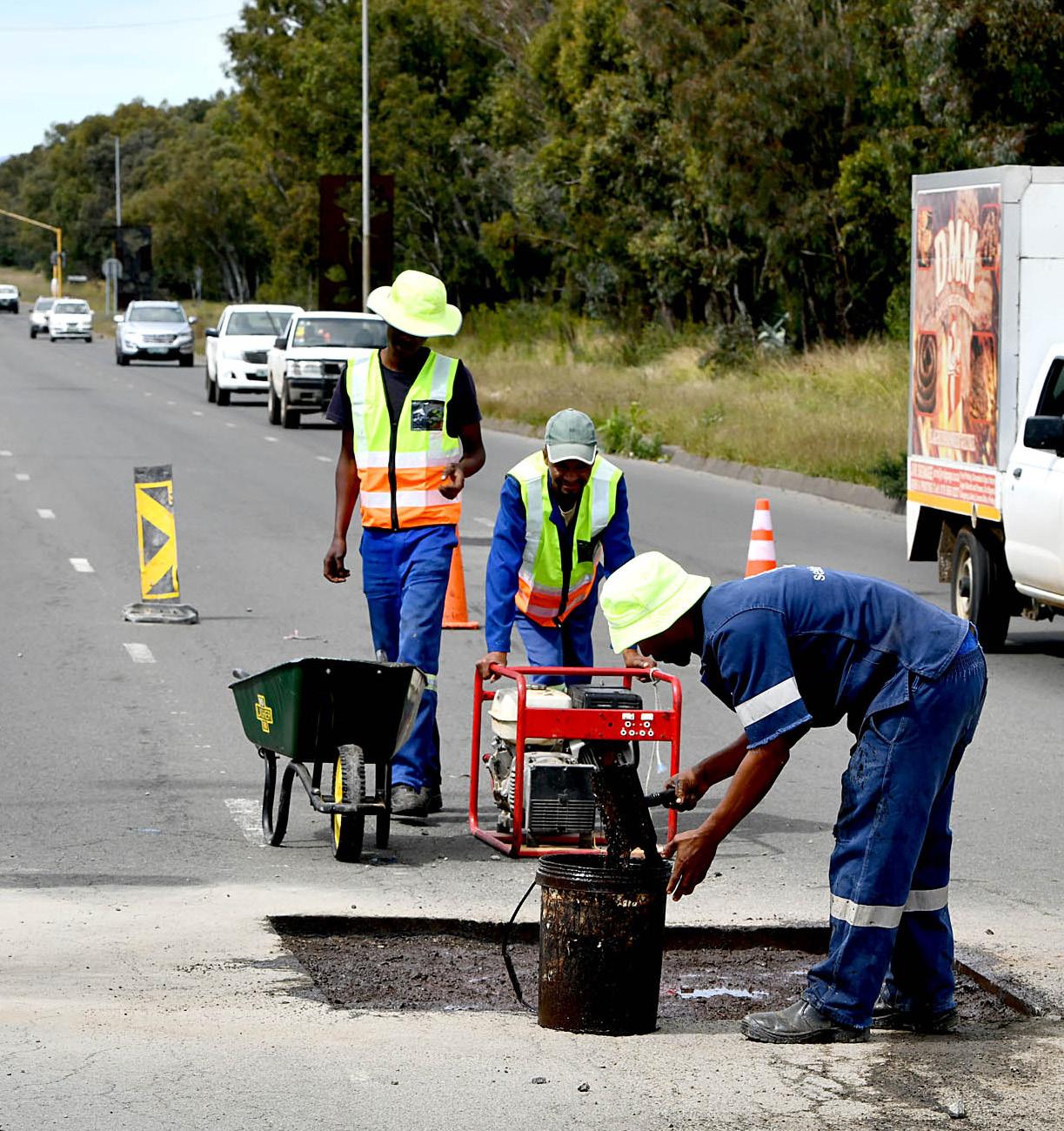
employment programmes.
This, he said, will include urgent service delivery priorities such as road upgrading through pothole patching and block paving, and infrastructure maintenance.
The President is of the view that public employment can also assist in tackling social challenges, such as genderbased violence and femicide, and substance abuse.
The programme will also support tackling clean energy installation and catchment management to improve water quality and limit the risks of floods.
The President said it could also help in the digitisation of public records and give young people a first step into this growing sector of the economy.
The President believes that the EPWP Phase 5 will rise to the challenge by increasing youth participation and strengthening skills development.
“As we enter this new phase, we must reiterate that there can be no space for corruption, nepotism or favouritism. Effective and fair recruitment practices must be applied.”
He called on social partners and the private sector to work with the State during Phase 5 to lend a hand in creating jobs
and work opportunities for South Africa’s youth, women and people with disabilities.
“Working together through public and social employment programmes and by providing support for small enterprises and cooperatives, we can create more jobs at a much faster pace while improving the delivery of basic services.”
The President has vowed to continue to expand public employment through the EPWP, the Presidential Employment Stimulus, the National Youth Service, and others.
In addition, he stated that government will assist civil society organisations that are creating work opportunities.
The Head of State also promised to back entrepreneurship and job creation by increasing support for small enterprises and cooperatives in townships and villages.
“We will continue to prioritise young people in public employment programmes, in work-based learning programmes, in artisan training and entrepreneurship programmes.”
He assured young South African men and women that government will not leave them behind.
“We are determined to reach you, one and all, to help you and to support you. This is the promise of democracy and freedom,” he said. ❖
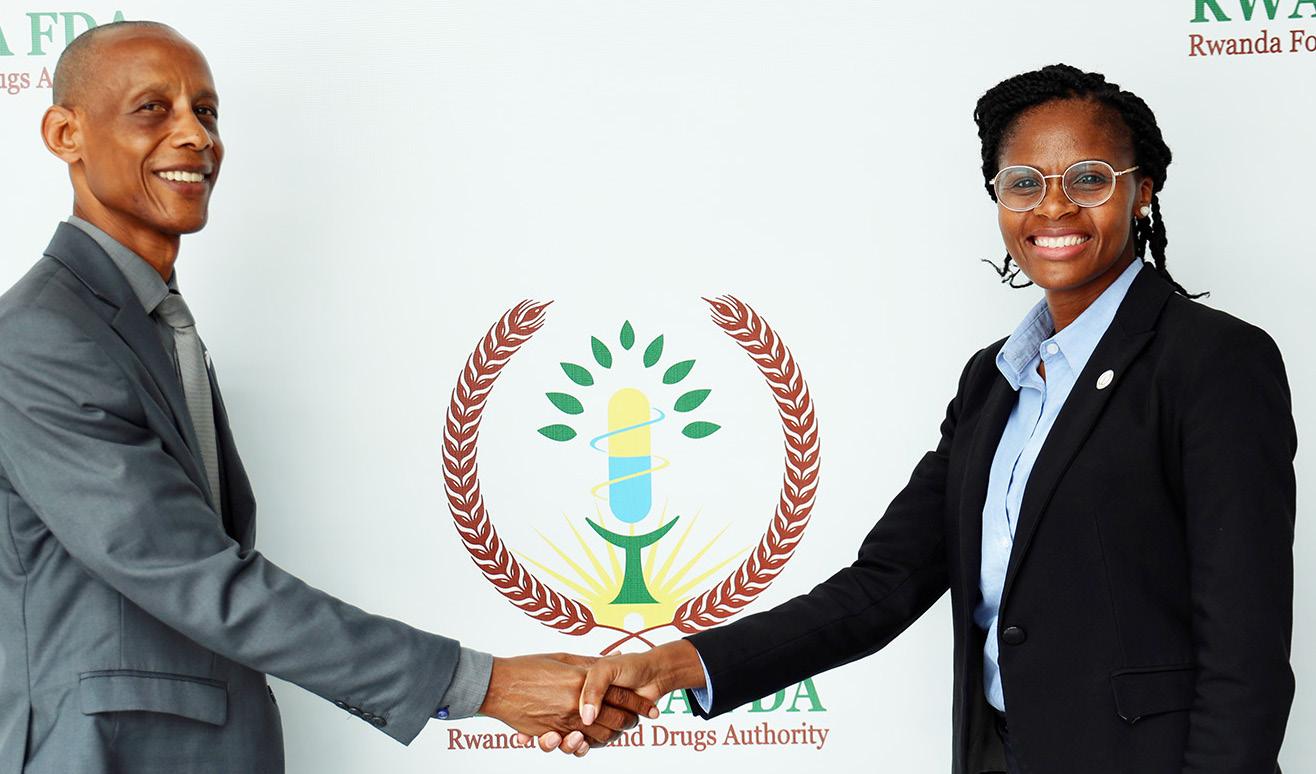
The South African Health Products Regulatory Authority (SAHPRA) has signed a Memorandum of Understanding (MoU) with the Rwanda Food and Drug Authority (Rwanda FDA).
The MOU between the SAHPRA and Rwanda FDA will allow the regulators to develop a cooperative partnership towards ensuring access to safe, quality and effective health products in the respective countries.
The two regulatory authorities will cooperate in joint products reviews and inspections to enable efficient access to health products. The World Health Organization has set up
an initiative for establishing a messenger RiboNucleic Acid (mRNA) technology transfer hub, together with six spokes, in Africa as a strategy to increase mRNA vaccine production capacity in under-served regions and thus promote regional health security. Rwanda is one of the spokes with South Africa being the hub. Building on this model, the SAHPRA and
Rwanda FDA will collaborate in the area of mRNA vaccines regulatory oversight.
“The forging of partnerships with fellow African national regulatory authorities, allows SAHPRA to further our drive in enhancing and building capacity on the continent,” said SAHPRA Chief Executive Officer, Dr Boitumelo Semete-Makokotlela.
“The signing of this MoU underscores the profound potential of collaboration among African NRAs [national regulatory authorities], affirming that the solutions to our shared challenges lie within our continent. Rwanda FDA staunchly believes in the power of collaboration and strategic partnerships.
“This MoU symbolises the culmination of dedicated efforts and signifies our unwavering commitment to facilitating mutual exchange and enhancing regulatory oversight. Through collaborative efforts with [the] SAHPRA, we aim to strengthen our regulatory capacity and promote public health. As we embark on this journey together, let us harness the collective strength of our agencies to advance the pharmaceutical sector in Rwanda and beyond,” said Rwanda FDA Director-General, Professor Emile Bienvenu. ❖
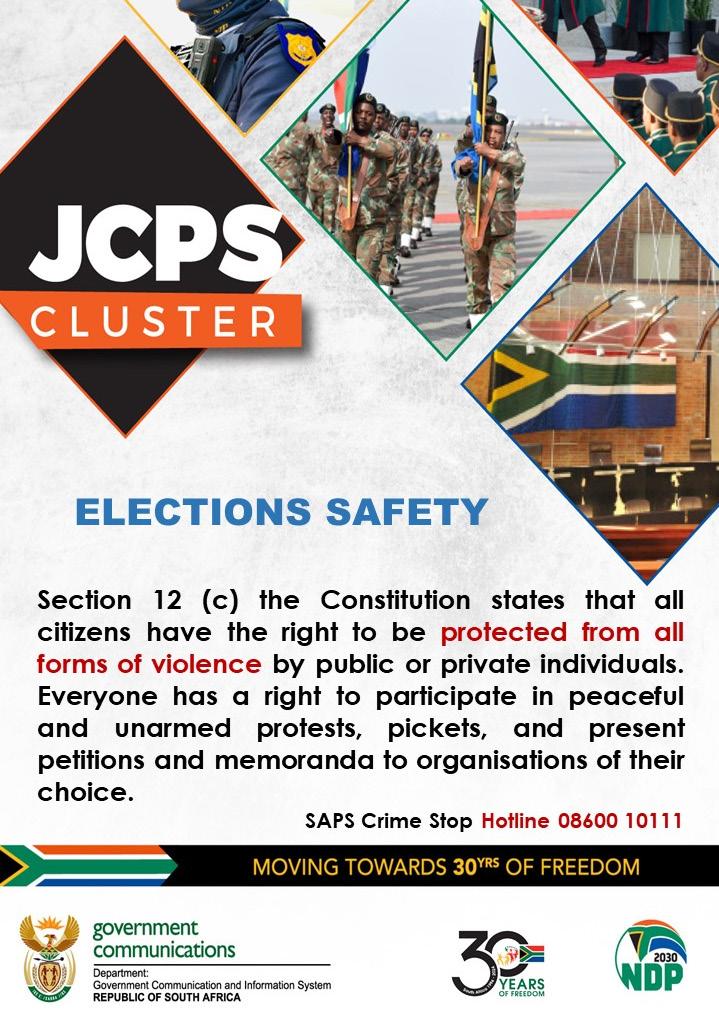

In an era where intercontinental collaboration has become increasingly crucial, the recent surge in tourism numbers from Kenya to South Africa demonstrates the transformative power of strategic policy-making and targeted marketing efforts.
From 1 January 2023, Kenyans have enjoyed visa-free travel to South Africa for a period of 90 days in a year. The scrapping of visa requirements for travellers between these two countries symbolises much more than a mere administrative adjustment. It marked a milestone in fostering closer ties for countries within the African continent, serving as a precursor for a new era of ease in travel and cultural exchange.
The impact of this regime change, coupled with our marketing strategies, has been profound as South Africa has since experienced a significant surge in visitors from Kenya. Between January and December 2023, Kenya recorded a 99% increase when compared to 2022, reaching 42 403 arrivals. A comparison of seasonality trends shows that in 2023, arrivals exceeded 2019 arrivals from January throughout, while in 2022, arrivals peaked over 2019 only in October. This is an incredible number of Kenyan tourists who chose to explore South Africa above any other destination.
Overall, South Africa welcomed 6.4 million visitors from the rest of Africa between January and December 2023, marking a significant 75.6% of all arrivals. In 2023, Kenyan tourists spent over 20% more than what they spent in 2019. The influx of Kenyan visitors to our country has had economic and cultural impacts. Tourism is a significant economic driver, not just in terms of revenue generation but also as a catalyst for job creation, cultural exchange and strengthening international relations.
As South African (SA) Tourism, we welcomed this with immense pride, and this is reflected in our marketing approach in Kenya over the years, which is multifaceted, dynamic and highly targeted. Through our insights, we know that Kenyans have an appetite for new experiences.
The current campaign, "There's So Much More to See" has successfully tapped into this sentiment, highlighting the lesser-known yet equally captivating variety of South African tourism products and experiences led by our warm, culturally diverse people.
Our digital campaigns have further leveraged Kenya's robust social media landscape, achieving impressive engagement metrics, including 100 189 114 impressions, 9 289 665 video views and 615 675 clicks. These figures are a testament of not only the power of digital storytelling for extensive consumer reach but also the importance of authentic brand stories that resonate with consumers. Without a doubt, this campaign has demonstrated an incredible capability to forge connections across borders.
In fact, SA Tourism has also since received wide acclaim and resounding success for the 2022/23 digital media campaign. The campaign, which featured renowned South African Rapper Sho Madjozi as the Cultural Curator for SA Tourism, focused on exploring Limpopo and celebrating Xitsonga culture through the Xibelani dance.
The campaign's success was affirmed by a slew of awards at the prestigious international Marketing and Communication Awards, further solidifying SA Tourism's digital prowess in the travel and tourism sector. As we look to the future, we focus on sustaining and building on this momentum. Our marketing strategies' continuous evolution and solid diplomatic relations remain
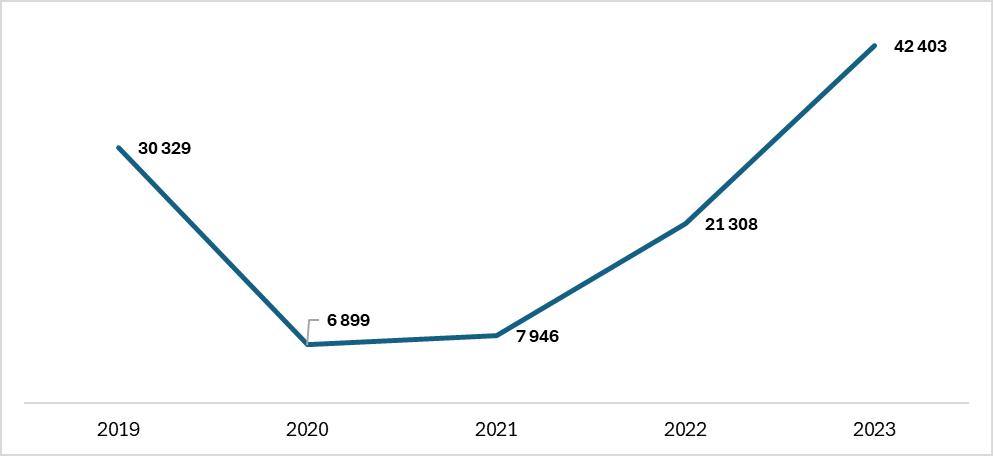
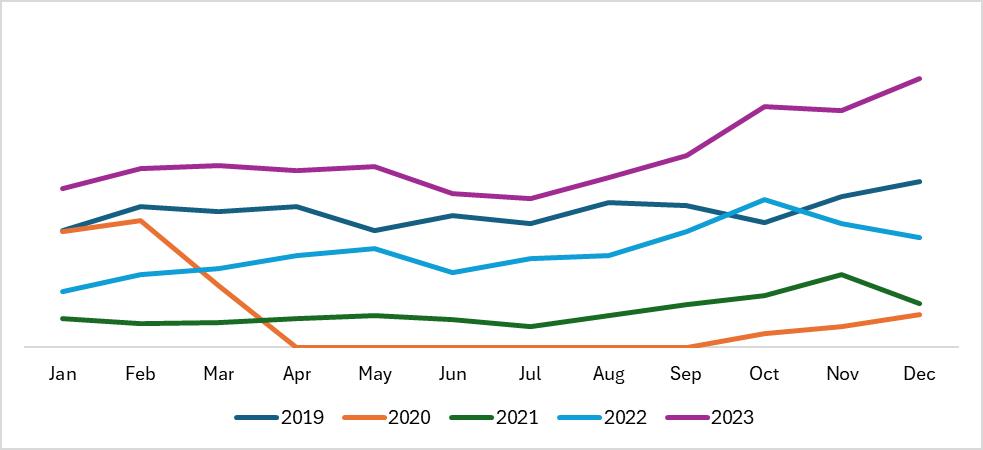
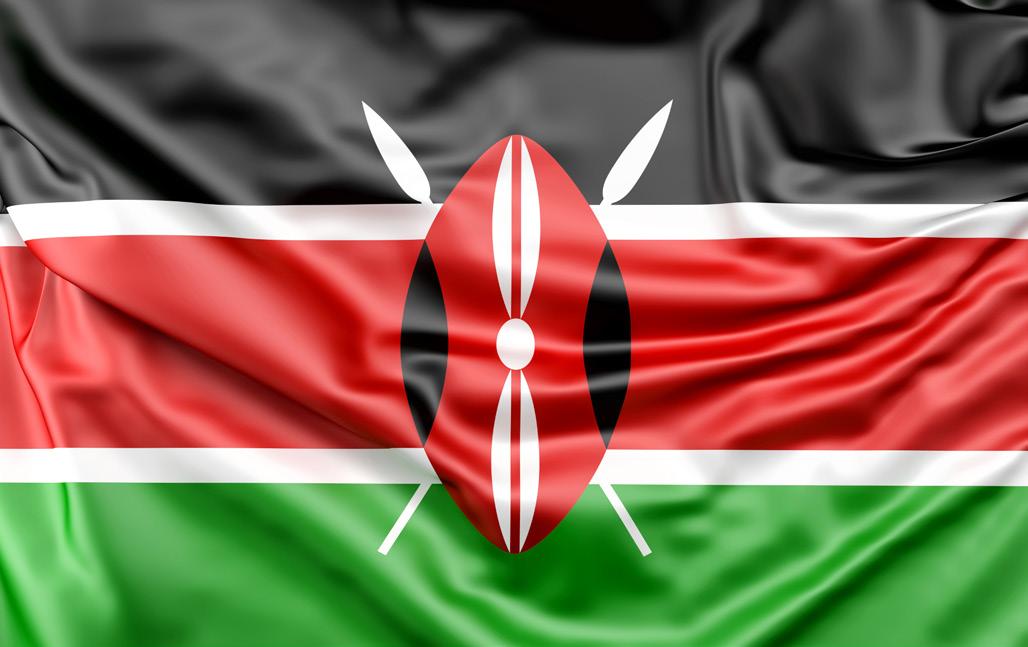
vital to achieving this.
We are gearing up for more powerful marketing campaigns and collaborations, including participating in the Magical Kenya Travel Expo and the East Africa Regional Tourism Expo. Such platforms allow us to showcase our diverse tourism offerings and engage with potential travellers and partners across the East Africa region.
The success of the visa-free regime in Kenya is a stepping stone that inspires us to aim higher and broaden our horizons. We are motivated and remain hopeful that through the various engagements within government, we will see this success replicated
with other African nations, fostering an even wider continent atmosphere of openness and connectivity. The lessons learned and the successes achieved in this endeavour are invaluable, providing a blueprint for future initiatives to bolster tourism within the continent.
This success story cannot be discussed without acknowledging the role of mutually beneficial bilateral cooperation. The collaboration between the governments of South Africa and Kenya has been the cornerstone of this achievement. Strategic partnerships in the aviation and
hospitality sectors have further facilitated this growth.
The codeshare agreement between Kenya Airways and South African Airways, which established direct flights between Nairobi and major South African cities, has been pivotal in enhancing accessibility and convenience for travellers, thereby stimulating tourism and promoting commercial and cultural exchanges.
This is more than a narrative of numbers – it is a beacon of African unity and cooperation. It is an exemplary model demonstrating how innovative policy solutions and targeted marketing strategies can unlock immense tourism potential.
This success represents a bridge to deeper understanding and shared prosperity and is a testament to the strength of collaborative efforts. As we celebrate this milestone, our vision extends beyond the immediate impact. We strive for a future where travel within our continent fosters deeper cultural
understanding and shared economic growth.
In this destination marketing journey, challenges and opportunities are intertwined. As SA Tourism, we remain committed to continue promoting South Africa and, indeed, to collaborating with the South African tourism industry and like-minded companies in the countries we market in to promote our continent’s tourism offering.
We focus on creating sustainable tourism practices that protect our rich environmental and cultural heritage while driving economic development. We understand that the true value of tourism lies not just in its economic benefits but also in its ability to transform communities, improve lives, and foster a sense of shared African identity.
The visa-free travel regime with Kenya is a shining example of what can be achieved when nations work together towards a common goal. It is a story of the endless possibilities that arise when barriers are broken and bridges are built. ❖
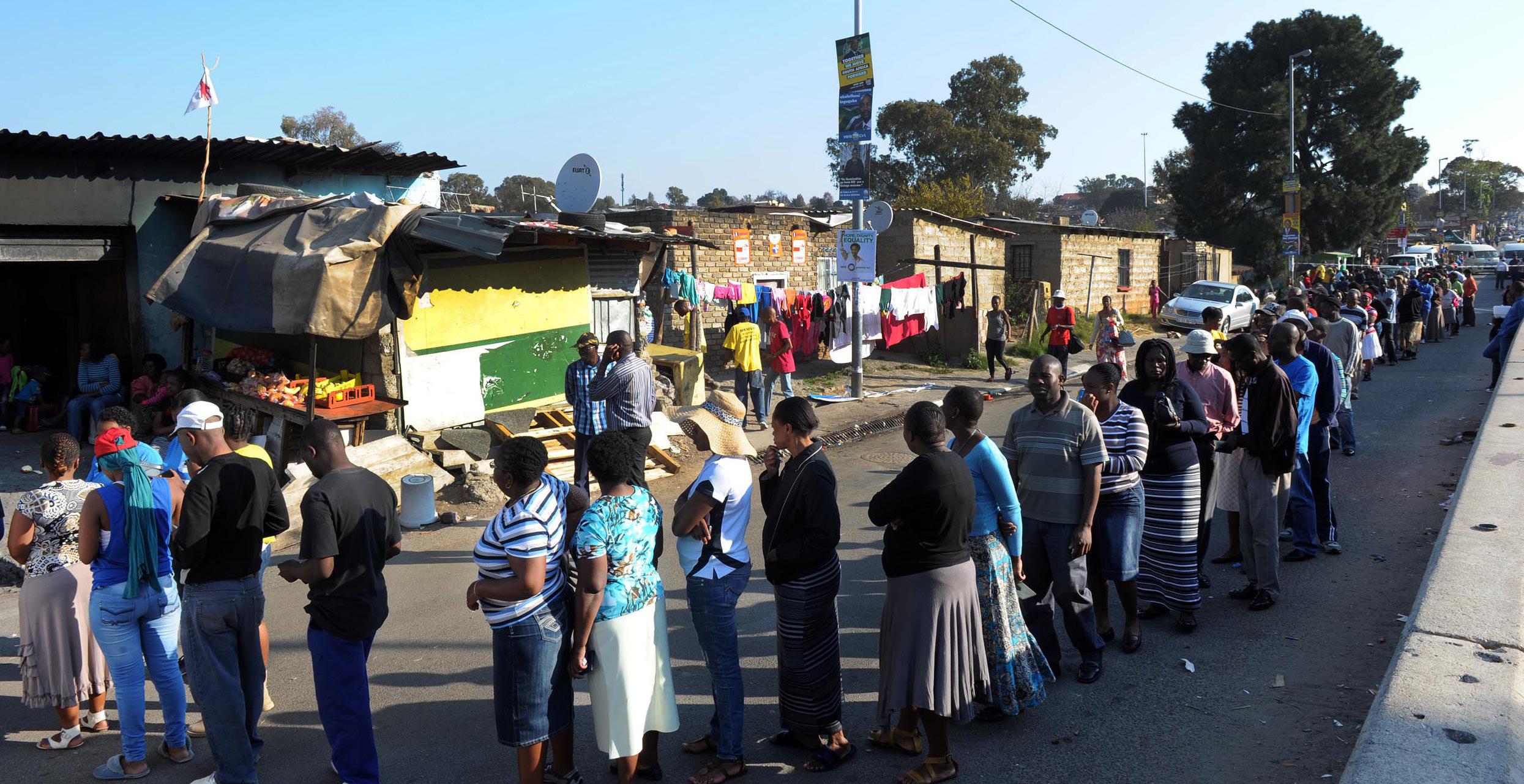
As South Africans prepare to cast their votes on 29 May 2024, the Electoral Commission (IEC) has reminded voters that they may only vote at a voting station at which they are registered. Those who will inevitably be away from their voting districts on election day may give a Section 24A notice of their intention to vote at another identified voting station by no later than 17 May 2024.
“Substantial progress has been made in preparation for the NPE2024 [National and Provincial Elections],” the IEC in a report.
On 12 April, the commission issued certificates to the 14 889 candidates who will contest 887 seats in the forthcoming elections.
“Nominations of candidates closed on 8 March 2024 and following processes of verifications and objections, 70 political parties and 11 independent candidates were published as final contestants in these elections.
“Fifteen political parties are contesting all tiers of the elections – the compensatory seats in the National Assembly (NA),
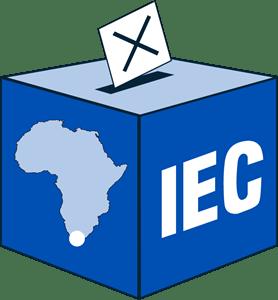
the nine province-to-national elections as well as the nine provincial legislatures. A total of 31 political parties will contest the national elections for the first time,” noted the IEC.
An analysis of the list of candidates reflects that at 58.14% are male, with female candidates at 41.86%.
The IEC has finalised the list of candidates contesting seats in the NPE2024. The 27.79 million registered voters will receive three ballot papers to elect candidates to represent them in the
NA and Provincial Legislatures.
“The use of the three ballots follows the amendment of the Electoral Act [of 1998], which was signed into law in April 2023,” said the IEC.
This amendment revised the electoral system to allow independent candidates to contest in the regional (province-tonational) tier of the NA and the Provincial Legislatures.
Although the phenomenon of three ballots will be familiar to voters in various local municipalities, it will be new to voters in metropolitan areas and for the first time in general elections
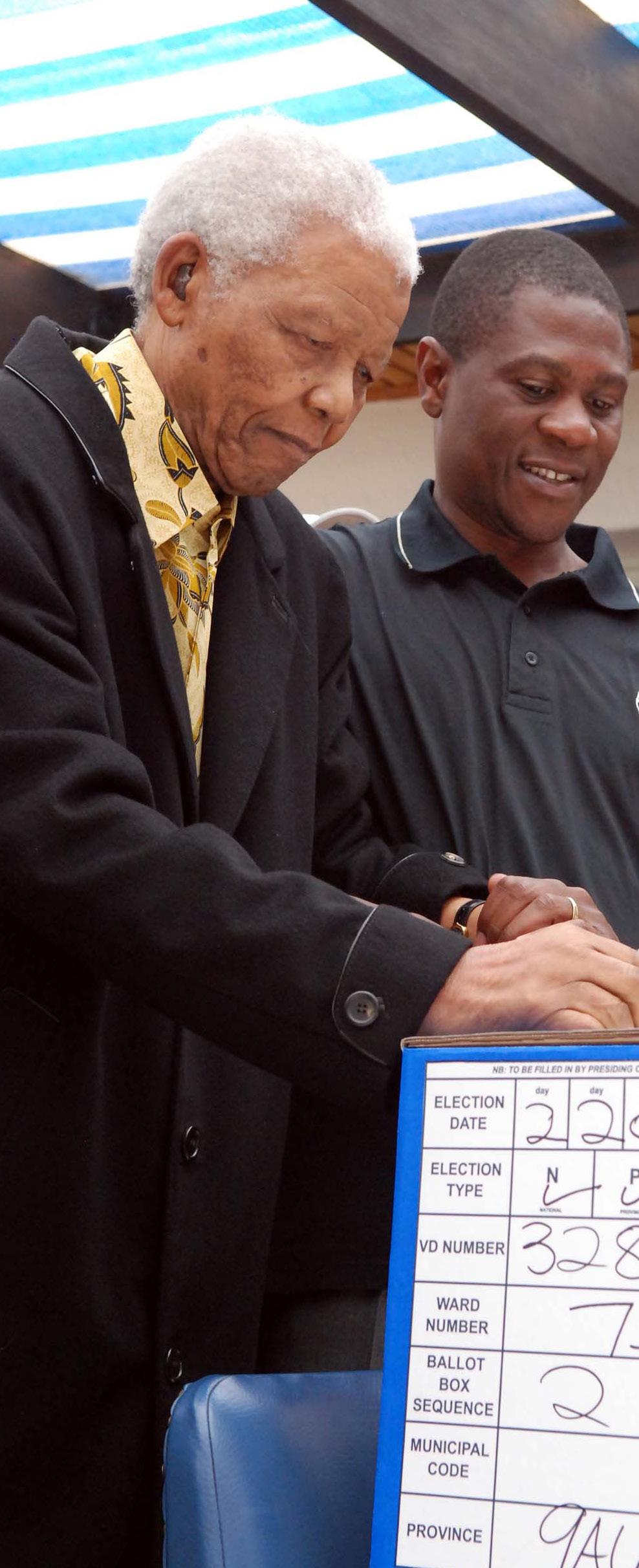
for national and provinces.
There are a total of 400 contested seats in the National Assembly. The proportional representation compensatory 200 seats will be contested by political parties only and there is a dedicated ballot paper for this tier of the NA.
The remaining regional or province-to-national 200 seats will be contested by independent candidates and political parties. This tier of the NA will also have a dedicated ballot paper.
This means that NA elections will be based on two ballot papers (national ballot and the
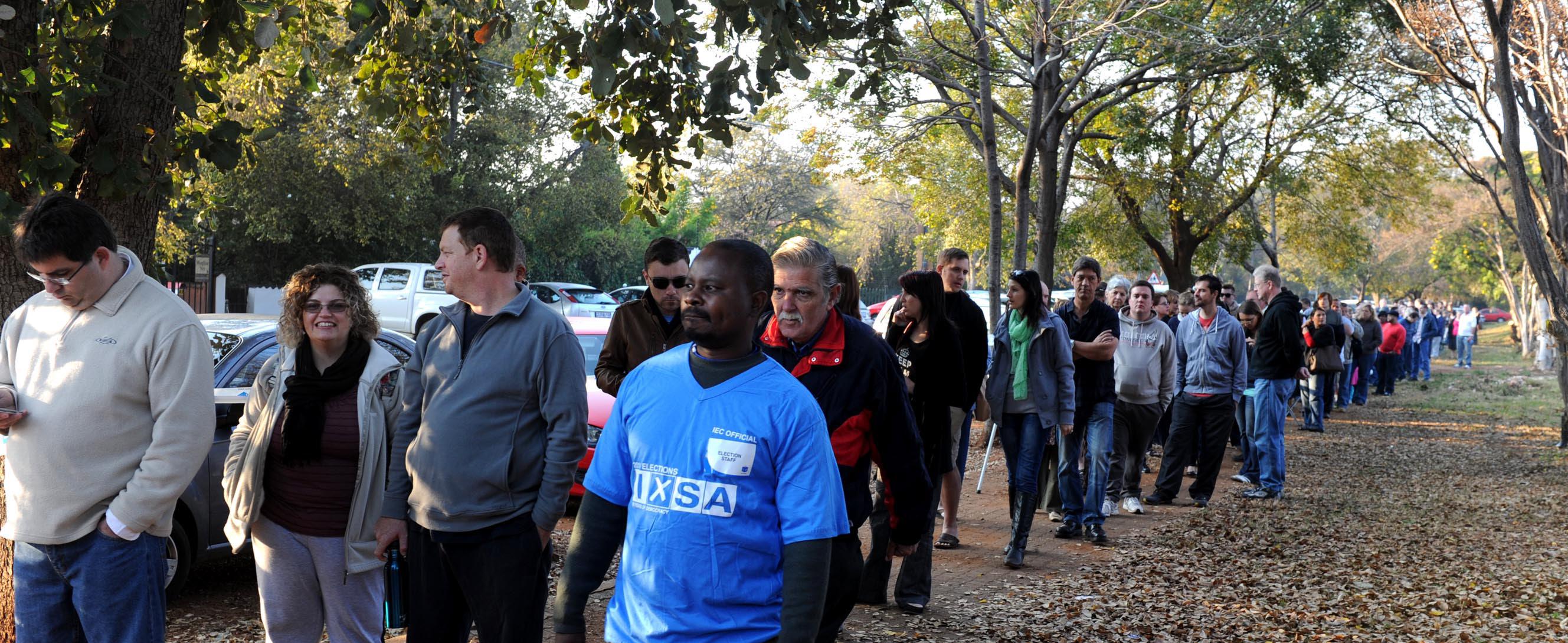
newly introduced regional or province-to-national ballot).
Therefore, the IEC said in respect of the elections of the NA, voters may elect a preferred party on the national ballot and elect another preferred party or independent on the regional ballot.
However, in respect of provincial elections, voters will elect a preferred party or independent candidate on a single provincial ballot.
The three ballot papers:
⦿ The national ballot: This ballot will consist of a list of political parties vying for 200 seats in the NA. It will be used to vote for political parties. There are currently 52 parties that will be on this ballot and the configuration will be a dual column.
⦿ The regional or provinceto-national ballot: It will have political parties and independent candidates contesting for the seats reserved for each province in the NA. Voters will use this ballot to elect
a political party or an independent candidate to represent them in the NA.
The number of contestants range from 30 to 44 on regional ballots. The configuration of this ballot is single column.
⦿ The provincial ballot: This ballot is unique to each province and includes parties and independent candidates competing for seats in each provincial legislature. This ballot will allow voters to choose either a political party or an independent candidate to represent them in provincial legislatures. The number of contestants range from 24 to 45 on the provincial legislatures’ ballots.
Voters are urged to carefully review and mark each of these three ballot papers before depositing them into the ballot box.
“Our appeal to voters is to remember that they can only put one mark on each ballot, more than one mark will result in a
spoiled vote and not counted,” explained the IEC.
The Universal Ballot Template (UBT), whose dimensions are benchmarked against the longest ballot paper, is in production and will be available in all voting stations. The UBT can be used by blind and visually impaired people, people who are dyslexic, and people with motor and neuron conditions which do not allow for a steady hand.
Home visits are intended for voters who are unable to travel to voting stations whilst special votes at voting stations are for everyone who is unable to be at the voting station on election day.
Special votes will also be administered at South Africa’s diplomatic missions abroad to service 58 000 registered voters. They will take place 10 days ahead of general voting in the country. ❖
For more information, visit www.elections.org.za
Writer: Minister in The Presidency for Planning, Monitoring and Evaluation, Maropene Ramokgopa. Photos: GCIS
“For to be free is not merely to cast off one's chains, but to live in a way that respects and enhances the freedom of others. The true test of our devotion to freedom is just beginning.”Former President Nelson Rolihlahla Mandela.
April 2024 marked an important milestone in the history of South Africa as our country commemorates 30 years since the advent of democracy in 1994. As we celebrate and remember the sacrifices of our fore-bearers who fought for the freedom and democracy we enjoy today, it is important to reflect on
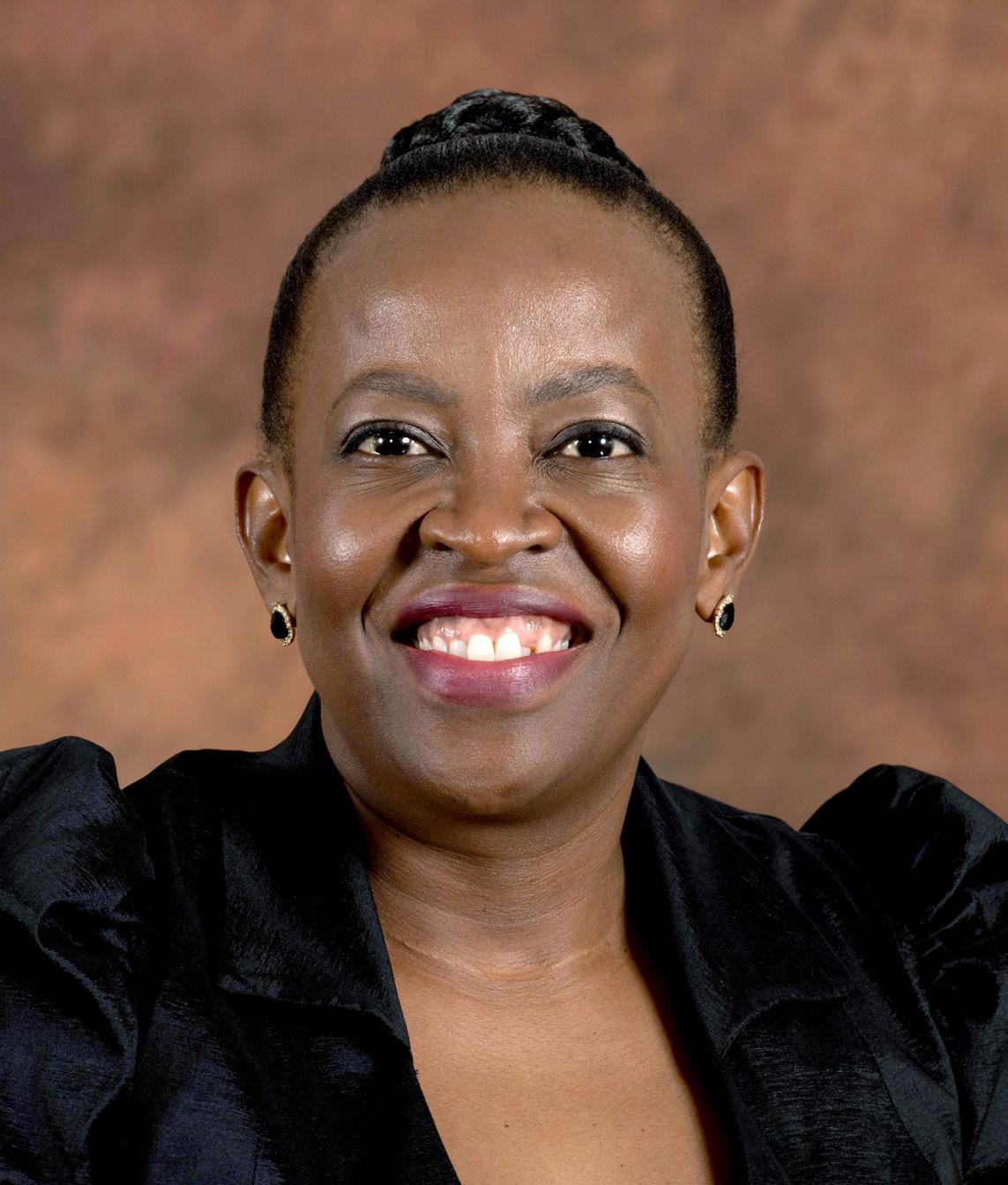
the strides made and the current challenges while charting a roadmap for the future South Africa we want.
It is against this background that the Department of Planning, Monitoring and Evaluation has undertaken and led a govern-
ment-wide review of the 30 years of South Africa’s democracy between 1994 and 2024. This review was considered and approved by Cabinet.
The review comprehensively assesses and reflects on how the general orientation of government priorities evolved to consider the state of developmental change and contextual environment. Equally, the review highlights key policies under the democratic government that delivered on the transformative agenda and created an enabling environment for different sectors to contribute to building and advancing our country’s democracy.
The period between 1994 to 2024 represented government’s resolve to build a unitary state and establish democratic institutions. Accordingly, the democratic project has been about undoing the stubborn legacies of apartheid that remain a feature of South Africa. When we took over in 1994, we faced the task of rebuilding a deeply wounded nation characterised by the triple challenges of inequality, unemployment and poverty. Furthermore, we inherited a
fragmented public service, racial spatial settlement patterns, stagnant economic growth, rampant public sector debt and a public sector dominated by white male personnel and institutionalised prejudice, amongst others.
The adoption of the Constitution of the Republic of South Africa of 1996 laid a foundation for an inclusive polity founded on human dignity, human rights, freedom, non-racialism, non-sexism and the rule of law. The Constitution became the blueprint for building our democracy.
The 30-Year Review Report highlights progress made since the seminal Reconstruction and Development Programme (RDP) which was introduced in 1994 as a strategy for fundamental transformation to undo the combined effect of past exclusionary policies. Its five interconnected objectives – to meet basic needs, build the economy, democratise the State and society, and develop human resources and nation-building – have remained relevant and found fresh expressions in policy priorities of all the six administrations post-1994.
Building a unitary state and establishing democratic institutions is a lifetime feature of building democracy. Commemorating 30 years of freedom and democracy is to have a deeper appreciation and understanding of the systems and institutions
in place to carry out the developmental agenda. Over three decades, we have witnessed government and its systems evolve and develop with time and space to meet the needs of the majority. The successful and regular five-yearly national, provincial and local government elections have enabled consistent renewal of the governing mandate.
While the democratic dispensation brought with it necessary political freedom and a break away from the policies of segregation, it brought the stark reality that socio-economic challenges needed to be addressed.
To sustain any transformation project, we needed an enabling
economic environment that would allow the development and growth of economic opportunities, prioritised redistribution, promoted industrialisation and innovation, and attracted foreign direct investment opportunities.
Building on the foundation of the RDP, successive policies were introduced to drive economic growth and development. These include the Growth, Employment and Redistribution strategy in 1996, the Accelerated and Shared Growth Initiative for South Africa in 2006, the New Growth Path in 2010, and the National Development Plan 2030 (NDP) in 2012.
Findings from the 30-Year Review Report reveal that the South African economy is three times larger than it was in 1994. It remains one of the largest economies in Africa and is the
most industrialised and technologically advanced in the continent.
South Africa’s labour market has expanded. The labour force grew from 11.3 million in 1994 to 28.3 million in 2023. This growth is due to progressive labour legislation, the race, gender, age and skills composition of the labour force.
However, while there have been significant gains in terms of growing our country’s economy since 1994, we still face obstacles just like any growing democracy. The past decade has been defiled by the increased frequency and intensity of natural disasters, the capturing of the State and its after effects, the energy challenges and high rates of unemployment, among others.
Nonetheless, these experi-
ences revealed the need for a renewed commitment to developing agile systems that can respond to the turbulence of our current realities. Our systems' agility will allow government to lead and progress on existing and new long-term plans, including the NDP. The high-level goals of the NDP are coherent with key international frameworks for development, namely: the 2030 Agenda for Sustainable Development, the African Union Agenda 2063, and the Southern African Development Community Regional Indicative Strategic Development Plan 2020 – 30. Most importantly, the goals are coherent with the aspirations of our people.
The third decade of our democracy represents government’s commitment to taking South Africa forward. We have witnessed government's daring policy interventions and structural reforms aimed at moving the needle toward accelerated development. Over the past 30 years, government has made difficult decisions and remained steadfast in its commitment to building better lives for all.
Government has made significant strides in meeting the basic needs of millions of households. From 1994 to 2022, 13.7 million
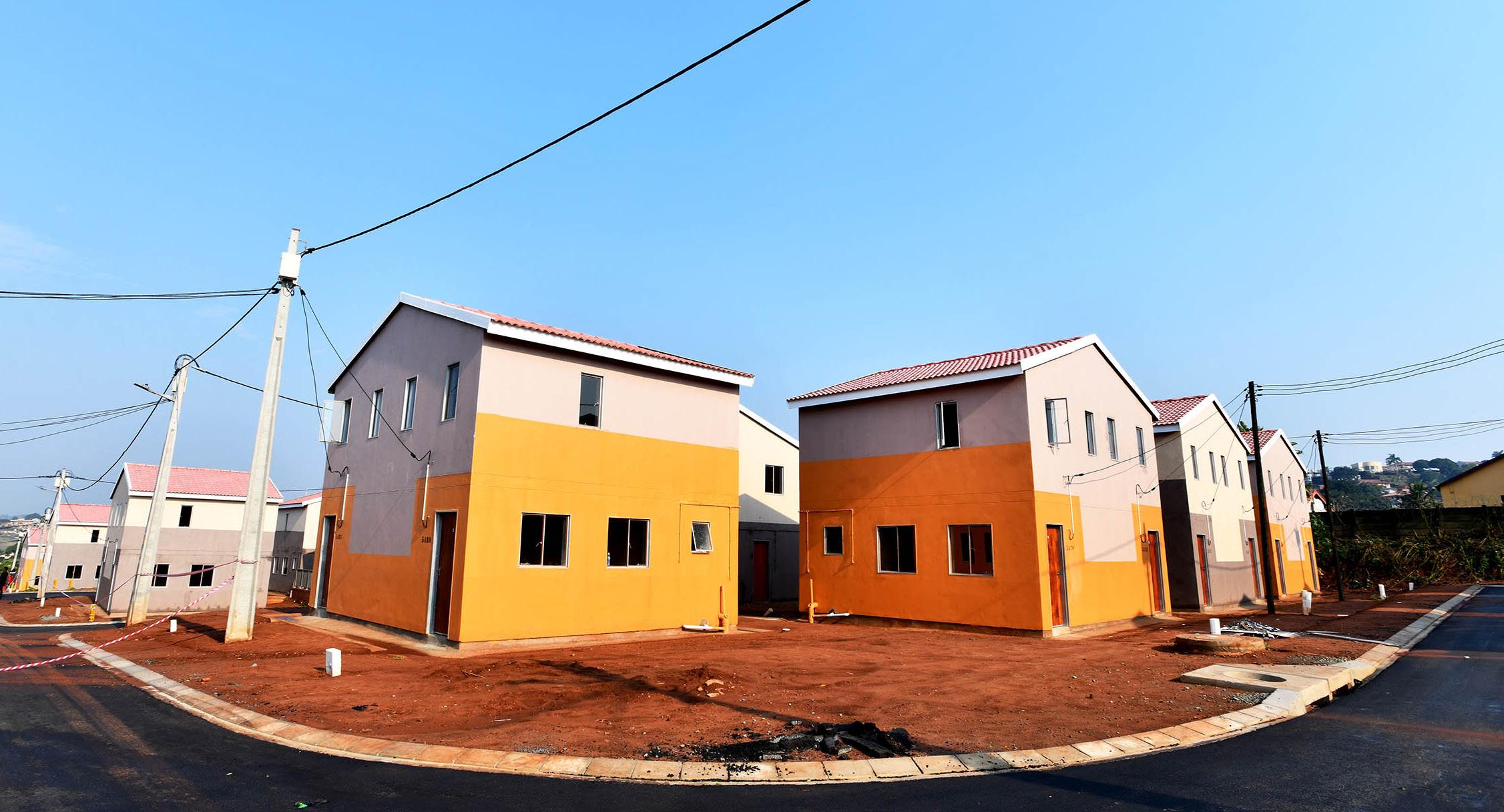
people (close to a quarter of the population) became beneficiaries of various social housing programmes – an unprecedented scale globally. The social housing programmes together with mass electrification, starting with Phase 1 of the National Electrification Programme (1994 – 1999) extended electricity access to 2.5 million households and public facilities, contributing to the 80% of households with access to electricity, piped water and sanitation by 2022.
The Clinic Building and Upgrading Programme and the provision of free primary health care; as well as the Integrated Nutrition Programme, are among the important building blocks for human development that government continues to advance and lead to gradual improvement of key indicators on the Multidimensional Poverty Index.
Essentially, we need to view the development of our democracy, parallel to the development of credible systems and public institutions. As mentioned by
President Cyril Ramaphosa during the 2024 State of the Nation Address, “We have established strong institutions to protect the fundamental freedoms and human rights of all people”. These systems and institutions play a critical role in ensuring that fundamental services, as highlighted in policy positions and programmes of the ruling party, are delivered to the people through ethical, transparent and accountable ways.
Government has also been at the centre of socio-economic transformation through the implementation of progressive policies and programmes targeted at improving the economy, society, governance and international relations.
We must invest in strengthening state capacity; fostering active citizenry and forming social partnerships to build greater determination in contributing towards developing South Africa. The 30-Year Review Report makes the necessary provocations aimed at cultivating public engagement across sectors on
the critical lessons and recommendations that will inform evidence-based planning and policymaking for the Seventh Administration, and as we move towards the 2030 target.
As we reflect on the past three decades, we have witnessed the gradual evolution of South Africa’s population, in size and composition, with far-reaching impacts on the general social, economic, political, and geographic development trends of the country. South Africa is in a critical stage of its development. Now, more than ever citizens of this country have the power and responsibility to influence the direction of the country for the next five years and beyond.
We must never trivialise the hard-earned gains of democracy, including the right to vote and participate in democratic processes. We have the collective responsibility to defend and advance our democratic gains by ensuring no one is left behind. ❖
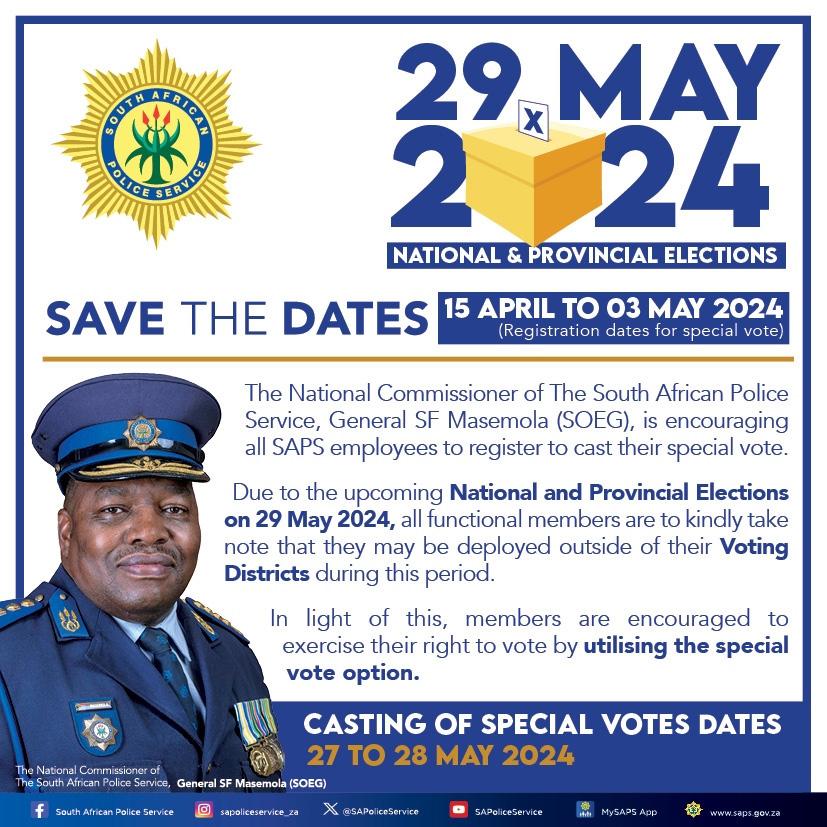
Over the years, local fashion designers have been raising the flag high at global platforms, competing with luxurious brands while telling a South African story. This is also true for many African fashion designers who draw the world’s attention to creativity and innovation.
This Africa Month, Public Sector Manager magazine is zooming into the work done by AfricaRise Online, which is mainstreaming the presence of African fashion enterprises and brands within the South African retail spaces.
AfricaRise Online is a premier destination for an immersive experience in the vibrant world of African fashion. It is dedicated to breaking barriers, championing diversity, and promoting a rich tapestry of styles that reflect the
dynamic essence of the African continent.
The company also has physical stores in Sandton City and Menlyn.
“We would like to have support of government in mainstreaming South African made clothing, art, accessories, books and beauty products in retail centres.
“There are high barriers of entry and we have done what we can in the last five years to build the industry, but we need government support as well,” said the Director and Chief Curator of AfricaRise, Thula Sindi.
The company believes in the power of diversity, and its platform is a testament to the kaleidoscope of cultures, traditions and artistic expressions found across Africa.
“From the intricate beadwork of Ndebele artisans to the contemporary flair of Nigerian design-

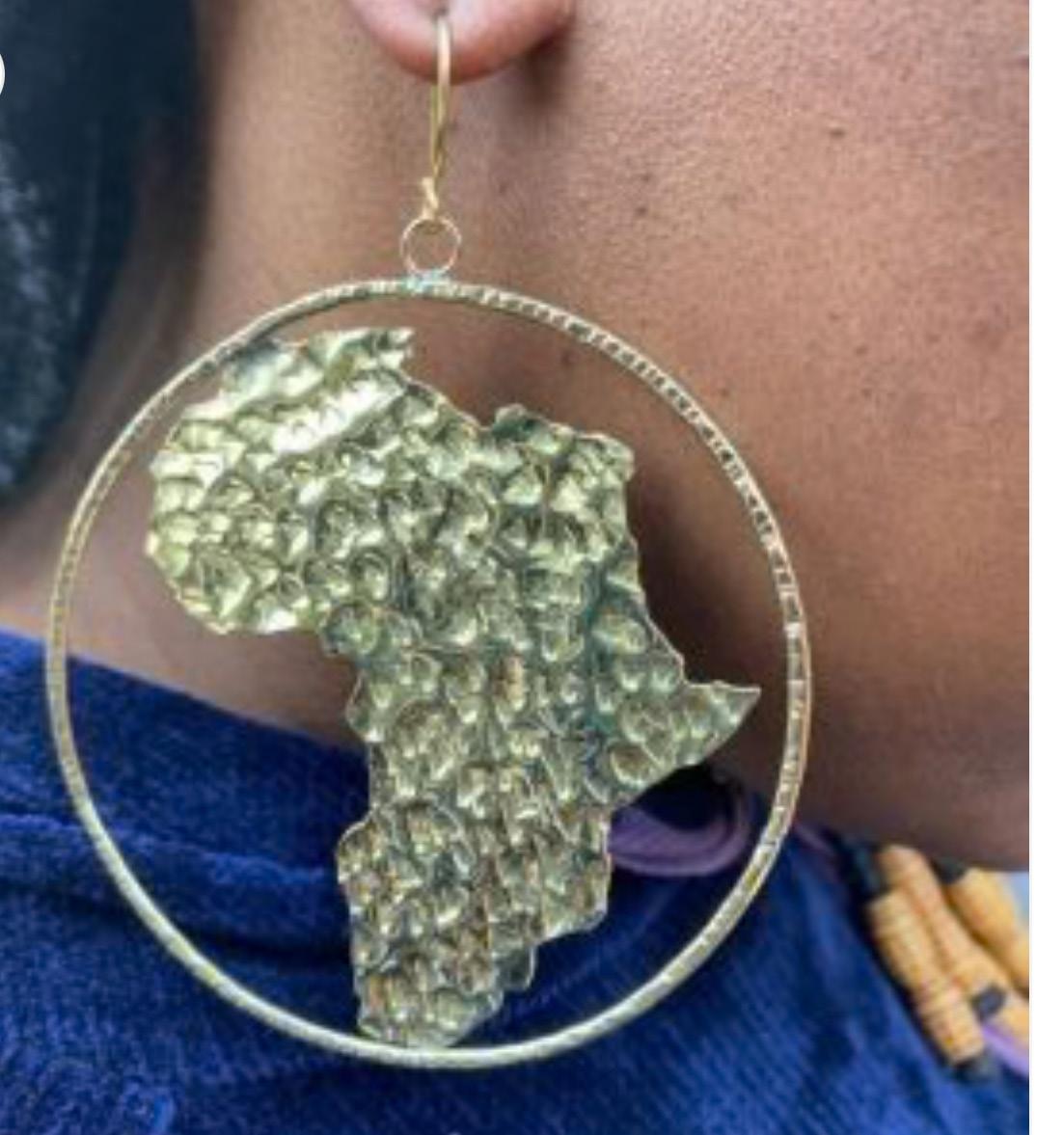
ers, we curate a collection that celebrates the richness and diversity of African fashion,” added Sindi.
Essentially, AfricaRise Online serves as a bridge, connecting talented designers with discerning customers who appreciate the uniqueness of African fashion.
More than 30 African designers have their designs listed on the platform.
Here are some of the beautiful designs that you can purchase online or at the physical stores:

For more information, visit www.africariseonline.co.za or email info@africariseonline.co.za or WhatsApp: 076 806 3616.

Writer: More Matshediso
Photos: #MaSisulu100 Cookbook

Cold weather can trick many people into eating unhealthy food because they are lazy to cook and just want to coil on the couch or c url-up in bed after work.
This may result in gaining weight or feeling unhealthy. You do not have to go through this. There are simple ways to prepare highly nutritious meals that do not require a lot of time yet have great health benefits.
In this edition, we share Chef Kgalemo Molaudi’s Prawn and Avocado Salad. Molaudi is graduate of the National Youth Chef’s
Training Programme (NYCTP).
The programme was established through a partnership between the National Department of Tourism and South African Chefs Association to address the need for cooks and chefs in South Africa’s hospitality industry. It aims to equip young, unemployed people with skills to become chefs.
Molaudi’s recipe was featured in the department’s #MaSisulu100 Cookbook – unique culinary collection of recipes compiled by beneficiaries the NYCTP.
“I was raised by my grand-
mother and she instilled in me a love for the culinary arts. She loved to bake, and I often found myself either weighing ingredients or stirring her pots. Cooking is my safe haven, and I love how simple ingredients can be turned into a wholesome meal like this Prawn and Avocado Salad,” she said.
Ingredients:
⦾ 10 large prawns (deveined, shelled, tails intact).
⦾ 1 teaspoon of crushed garlic.
⦾ 1 romaine lettuce (cleaned).
⦾ 1 cucumber (shaved into ribbons).
⦾ ½ cup cocktail tomatoes (cut in halves).
⦾ 1 small julienne red onion.
⦾ 1 large ripe avocado (sliced).
⦾ 1 pinch sea salt.
⦾ ½ teaspoon crushed black pepper.
⦾ 2 tablespoons of butter.
⦾ 60 ml balsamic glaze.
Method: Prawns:
⦾ In a large pan over medium heat, heat two tablespoons of butter.
⦾ Add the garlic and sauté until it begins to soften.
⦾ Add the prawns, salt and pepper and sauté until it has cooked through (4 to 6 minutes). Allow to cool.
⦾ In a mixing bowl, toss together cucumber, cocktail tomatoes, red onion and lettuce.
⦾ Add the prawns and then avocado on top of the lettuce and drizzle with balsamic glaze.
“You can serve this as a starter or enjoy as a light meal,” said Molaudi.
This meal can be enjoyed with any South African wine of your choice. ❖

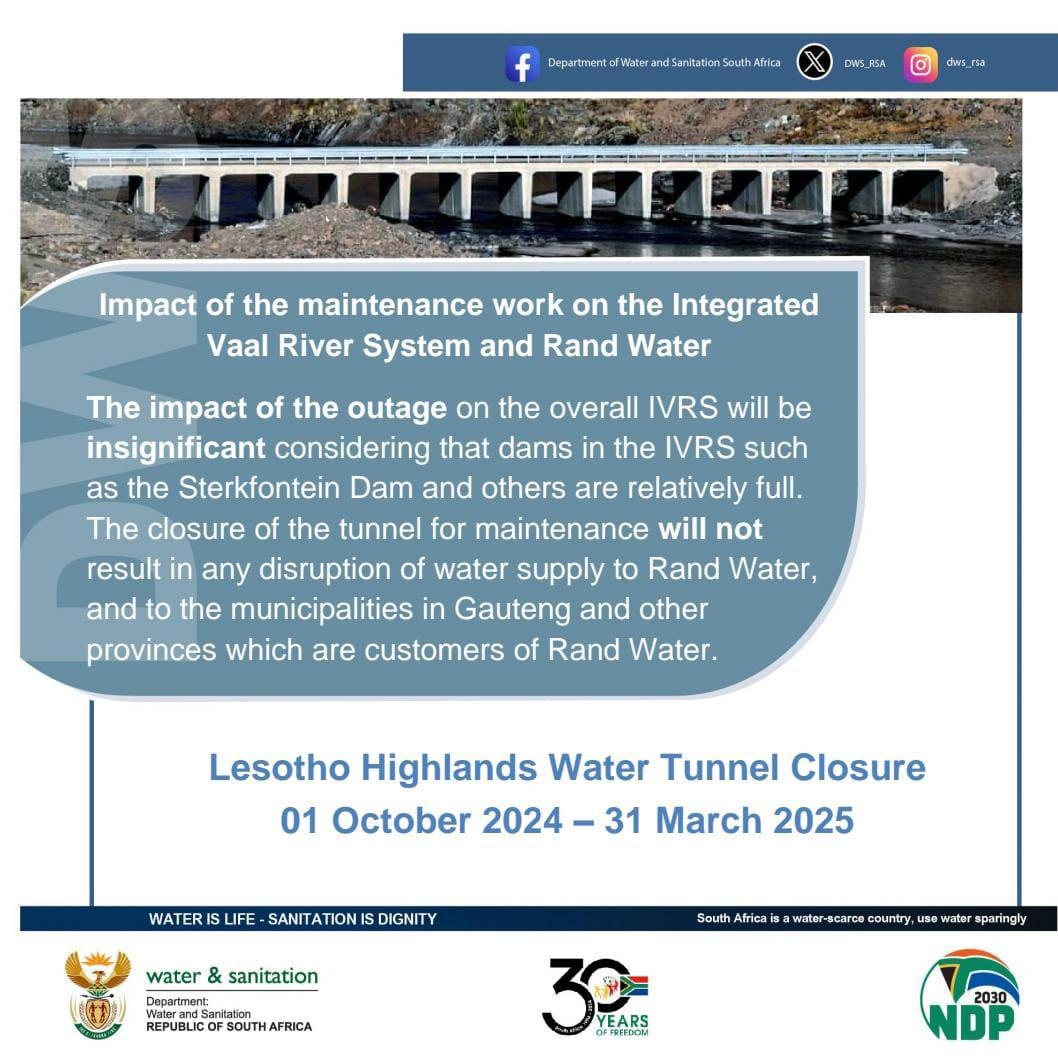
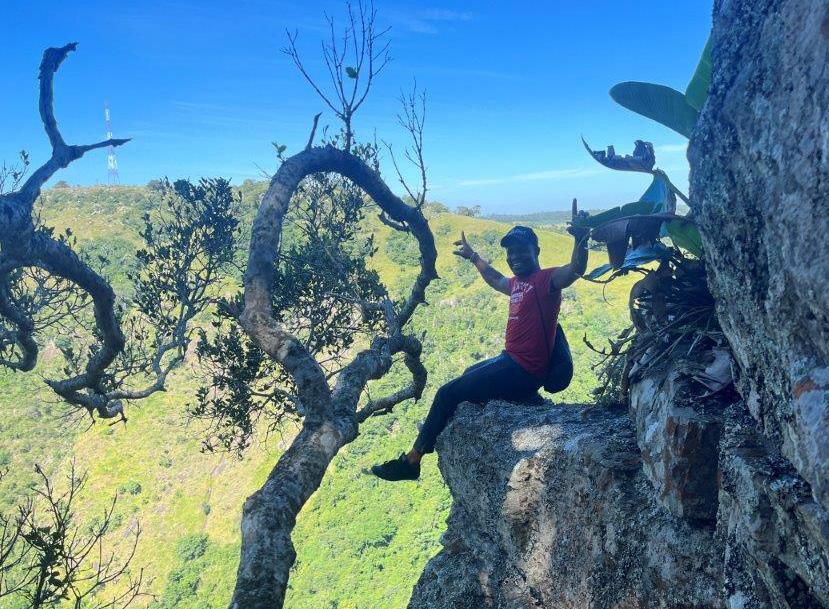
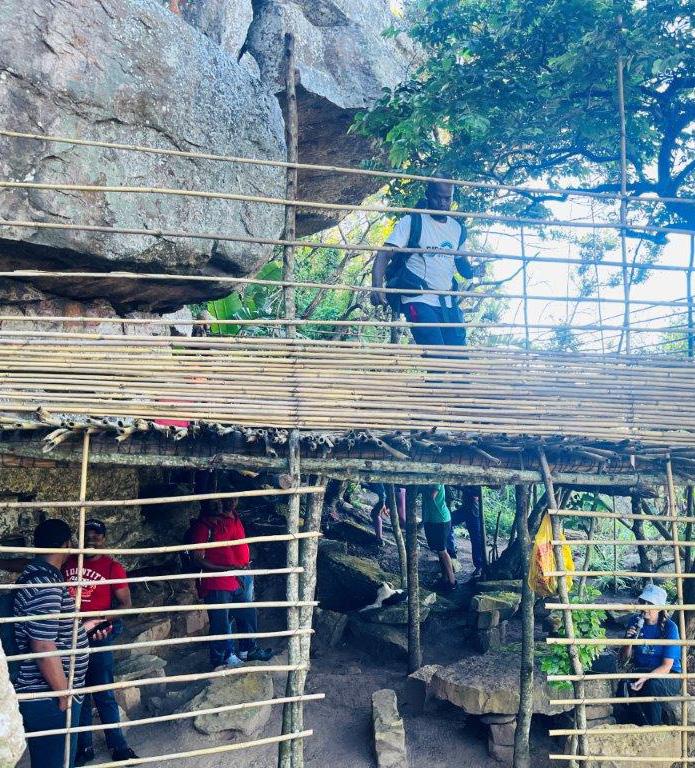
While the Paradise of the Zulu Kingdom is renowned for its Blue Flag beaches and world-class dive sites, the enchanting hinterland is home to incredible natural beauty and adventure. South Coast Tourism & Investment Enterprise (SCTIE) continues to extend
these rural tourism offerings with the recent launch of the KwaNdwalane Adventure Experience.
“We are thrilled to be launching the KwaNdwalane Adventure Experience as a way to increase the tourism footprint in the hinterland, while giving visitors a unique experience in
the great outdoors,” commented Deborah Ludick, Acting Chief Executive Officer of SCTIE.
“This tourism experience is set to attract outdoor enthusiasts, adventurers and nature lovers who will enjoy a guided hiking tour that includes river crossings, a waterfall experience and great birding.”
Situated between Port Shepstone and Paddock en-route to Oribi Gorge is the beautiful KwaNdwalane, which falls under iNkosi SN Ndwalane. This region is rich in natural beauty, including mountains, cliffs, rivers, forests and the 80-metre waterfall. The KwaNdwalane
Adventure Experience is split into two routes – the established Nyandezulu Experience and the new Madakane Route – both of which wind to the waterfall where visitors can take a refreshing dip.
Nyandezulu Experience
Nyandezulu is a rural village located 9 km inland of Shelly Beach. This is a guided tour that includes an overnight stay in a guesthouse in the village, with a hike to Ntantana Mountain, which overlooks the Nyandezulu Waterfall on the Izotsha River. Guests will enjoy a walk to a Shembe Church and the top of the holy uMdlungwana Mountain, reputed to harbour a seven-headed water monster.
Madakane Route
This new route starts at
Phola Park, 1.5 km from Murchison Provincial Hospital some 14 km from Port Shepstone. Along this 5 km route, visitors enjoy a hike through the indigenous forest home to hundreds of protea flowers. The walk also goes along the Izotsha River to the waterfall, with designated picnic and braai areas in full view of the waterfall and surrounding areas.
Incredible birds and wildlife can be sighted, including bushbuck, water mongoose, warthog, and porcupine. The route goes past local eateries such as Carrot House, Halalisa Restaurant and shisanyama.
Get back to nature with a KwaZulu-Natal South Coast breakaway. ❖
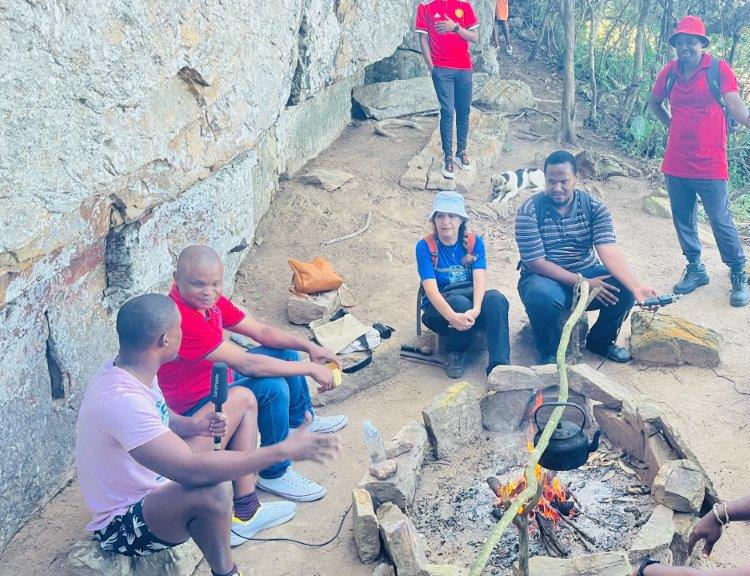
Known as the ‘Paradise of the Zulu Kingdom, the KZN South Coast stretches 120 km from Scottburgh to Port Edward and inland to Harding. Here, the spirit of adventure can be discovered among the many cultural experiences, as well as the 35 nature trails and 58 beaches, ideal for activities like river rafting, abseiling, suspension bridges, paintball, surfing, canoeing, beach horse rides, shark cage diving and free diving.
Nicknamed ‘The Golf Coast’, there are 11 golf courses on the KZN South Coast, ranging in difficulty, with endless hiking, mountain biking and 4x4 trails for more rugged excursions. Promoting sustainability, the KZN South Coast has a growing agri-tourism sector that offers world-class produce and hosts tours and excursions. The region boasts several permanently managed Blue Flag beaches and is home to some of the world’s top diving sites – Aliwal Shoal and Protea Banks. The originality continues with the annual Sardine Run, coined the #GreatestShoalonEarth, which is the largest biomass migration on earth and a marvel to witness. The region’s many nature reserves are inhabited by indigenous birds and wildlife, and it holds the title of ‘smallest desert on earth’, The Red Desert in Port Edward. The KZN South Coast is a fastemerging meetings, incentives, conferences and exhibitions destination, which has played host to several high-profile events, including the Bike Fest, Conservation Symposium, Ocean Festival, Uvukile Gospel Festival, Ugu Jazz, Ugu International Film Festival, and the South Coast Fever MTB & Trail Run Series.
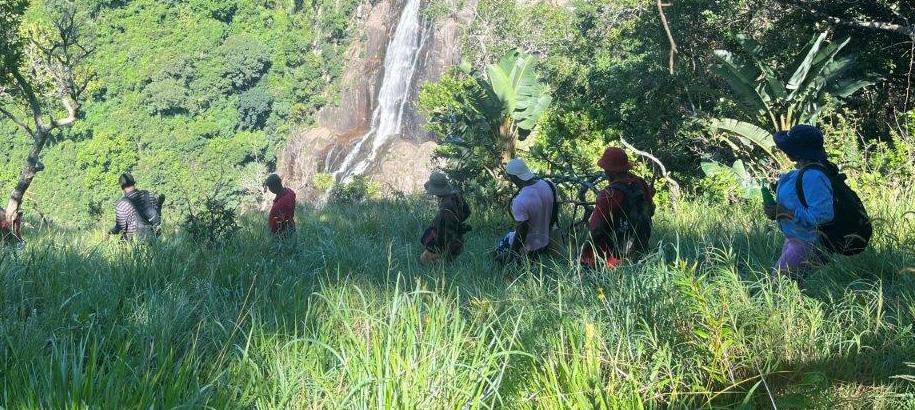
Find out more by following South Coast Tourism on Facebook, South Coast Tourism and Investment Enterprise on YouTube, @infosouthcoast on Twitter and Instagram, and South Coast Tourism & Investment Enterprise on LinkedIn.
